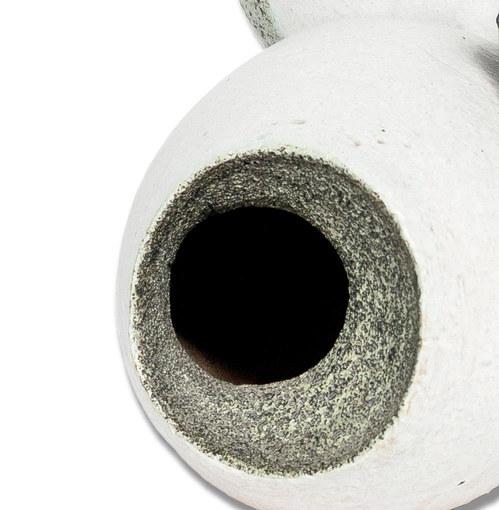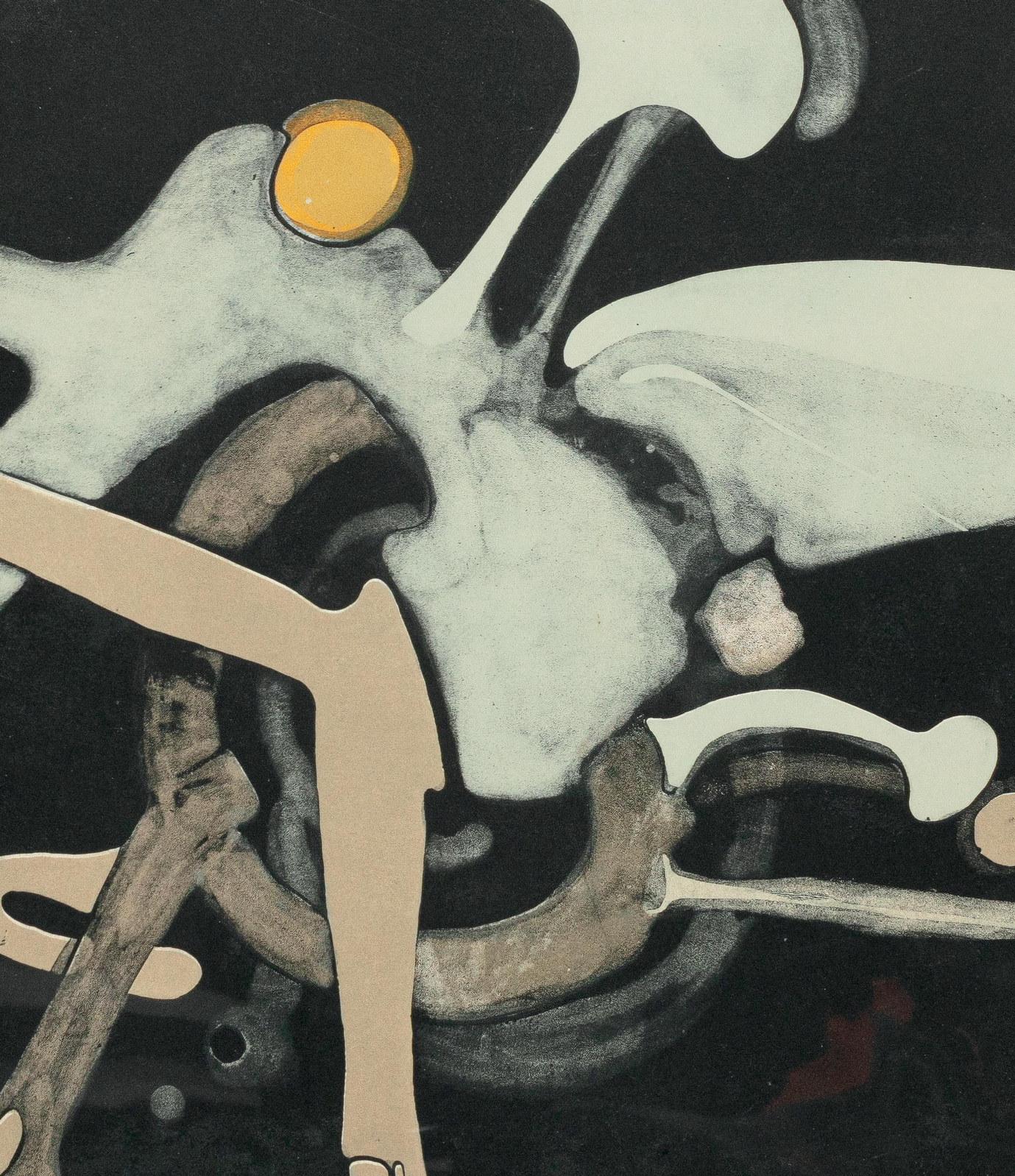
e Collection of the James T.



e Collection of the James T.

Produced in association with Black Art Auction, Saint Louis, MO
Black Art Auction proudly presents a landmark collection of AfricanAmerican art curated by renowned scholar and collector James T. Parker of Chicago’s South Side.
Parker amassed an impressive collection of African-American art in his lifetime. In addition to this book, a website has been created at www.thejamestparkerarttrust.com where you will find the entire collection and information regarding the artists behind the works.
(October 19, 1940- September 12, 2024)



James T. Parker was born in Montclair, New Jersey, to James Parker and Clarice Eudora Simmons in 1940. At the age of nine, he moved with his brother, Carlisle, to Wilson, North Carolina. He enrolled at Winston-Salem State University in 1958 and graduated with his BA in 1962. He continued to earn his Master of Arts in Teaching in 1965.
After graduating, Parker moved to Gary, Indiana and taught for a few years at the Garnett Middle School. The school was located about two blocks from the family home of Michael Jackson and his siblings, and Michael attended Garnett Elementary in the mid-1960s.
Jim enjoyed a long career in education and taught Special Education in the Chicago School District for 30 years. He also traveled to Japan for one year and became deeply interested in Japanese printmaking. While the core of Jim’s art collection is dedicated to works by African American artists, he also collected in many other areas, including modern Japanese woodblock prints.
Parker was a long-time resident of Hyde Park, on the South Side of Chicago, and served on the board of the Nathan Manilow Sculpture Park (2013), located on the campus of Governors State University, University Park, Illinois. His commitment to art and education led him to participate on many boards and maintain memberships at numerous museums, including the Weatherspoon Art Museum, University of North Carolina, Greensboro; the Art Institute of Chicago; the Ackland Art Museum, University of North Carolina, Chapel Hill; the DuSable Black History Museum and Education Center, Chicago; and the Museum of African American Art, Los Angeles, CA.
He served as an advisor to the Southside Community Art Center, was a host committee member for the Legends and Legacy Award for Dr. Margaret T. Burroughs, and a steering committee member for the University Of Chicago: Arts and Humanities in Public Life Initiative. He worked with the New Jersey State Museum Bureau of Education (19941996) and acted as an art fiduciary advisor, with one of his first clients being Richard Hunt.


written by Thom Pegg, Black Art Auction
It was a cold December afternoon, a Saturday in the mid-1990s. I was working as an independent specialist of fine art at the John Toomey Gallery, in Oak Park, Illinois, a western suburb of Chicago. There was a preview for an upcoming auction happening that day, a sale that included two works by Chicago painter, Fred Jones. It was impossible not to look up each time the front door opened because a blast of biting wind accompanied the latest previewer.
The man was bundled up tight, and as he began to slowly emerge from underneath his hat, scarf and gloves, I could see he was an unassuming African American man in his fifties. He took a quick scan of the walls, and made a beeline for the two Jones paintings. This piqued my curiosity because, at that time, people who knew the work of Fred Jones were few and far between, and this man seemed to have come out on this ferociously cold day to gaze only upon them.
I walked over and introduced myself. Initiating the usual small talk—but with an increasingly elevated agenda—I asked about the Chicago roads, if he had an interest in Black Chicago artists, and where he lived. I learned a few things: he had ridden there on the bus, he knew a LOT about Black Chicago artists, and he had no intention telling me where he lived.
Thirty years later, give or take a couple of months, I have been bestowed the honor of presenting to the world that man’s collection of art. They tell me his name was James Parker. I knew him as Jim. He told me his name was Jim that day.
I enjoyed many conversations with Jim about Black Chicago artists in the following thirty years, and probably mentioned the weather from time to time, and he eventually even told me where he lived, but he never had any intention of inviting me over. I couldn’t blame him; I was a dealer and shared his passion for the work of many of the same artists, and he really just wanted to save us both from temptation. Countless times I would go to someone’s house on the South side to look at art for sale or consignment and when I




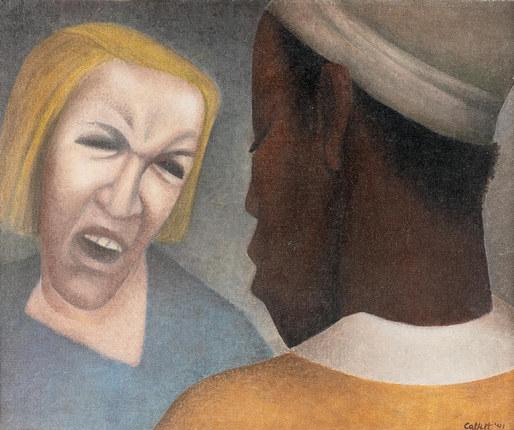







walked through the door, Jim would be sitting there. After about the tenth time, I would just shake my head and smile. That was who he was. He looked out for everyone and everyone trusted him. He knew most of the artists and all the art.
Jim corresponded regularly with Romare Bearden, Ed Clark and Martin Puryear; he ate lunch every week with Richard Hunt, and was with Richard the day he passed. He maintained close friendships with Earl Hooks, Sr and Marion Perkins. He took the experiences shared within his close circle of artist-friends and established a core perspective from which he extended to artists’ work in general. He developed ideas about what to look for within a single artist’s body of work and simultaneously, how to build a collection inclusive of a variety of styles and subjects representative of an overall Black art experience.
This collection illustrates not only the artist’s need to create a pathway of communication to their audience but also the various ways artists construct that pathway, be it through a narrative or abstract style, and through the message itself—the subject matter.
Parker’s collecting interests were clearly defined, and divided into almost exclusively two halves: figurative and abstract. There are a very small number of outliers, such as landscapes by Richard Mayhew, William Edouard Scott, and John Wesley Hardrick, as well as two traditional still life paintings, one by Beverly McIver and another by Joseph Delaney.
When viewing the collection, it is apparent that the figures are exclusively the subject: there are many direct portraits, and if the figure is engaged in any activity, the composition is close-cropped. Chenoa Baker’s essay accompanying this project, The Rich Tapestry of Black Artistic Expression in the James T. Parker Collection, delves into this in great detail. Compositions presenting figures in a relevant setting or engaged in an activity are almost completely absent. The works by Romare Bearden and Eldzier Cortor include figures in a setting, but they are used metaphorically, not to depict real people. Fred Jones’ magic realist imagery utilizes figures as alternate identities. Sculpture portraits by Augusta Savage (Gamin) and Elizabeth Catlett (Cabeza Contando) present the same agenda in three-dimensional media. Robert Sengstacke’s civil rights-era photography is perhaps the sole exception.



Parker’s affinity for powerful abstract compositions is equally apparent. Sculptures by heavyweights, Richard Hunt, Martin Puryear and Terry Adkins are as pure of form in their abstraction as Savage’s Gamin is in it’s development of a human personality.
Adkins’, Play Heavy, (1993) and William T. Williams’, untitled, offer visual references to jazz through abstraction. Alma Thomas and Norman Lewis do the same with natural subjects: Thomas abstracting bright floral colors and Lewis depicting a muted, moody seascape.
From Ed Clark’s sweeping abstraction (untitled-New York Series, 2004), it’s pure painting, confessing only color and energy, to Howardena Pindell’s, untitled 50, (1974), an intimate collage made up of confetti-like disks, created with a paper punch, which she numbered with black ink and applied with spray adhesive to a board— at random and intentionally with tweezers.
There’s Sam Gilliam’s Hanover (1975), layering canvas strips and an abundance of paint over a beveled edge stretcher, utilizing only color to create the composition to monochromatic sculptural vessels in ceramic by Earl Hooks, Sr., communicating solely with form.
Perhaps the most remarkable aspect of Jim Parker’s collection is the inclusion of significant works by artists not named Sam Gilliam or Alma Thomas. This is the mark of an astute collector. Jim did collect works by well-recognized artists , discovering what it was about that work that made it successful; then, he applied the same criteria to works by lesser-known artists. The key wasn’t about one looking like the other, it was about how the artist achieved his or her goal. Irene Clark’s Girl with Pear (untitled, c. 1950) is a highly successful image, executed in her unique Neo-primitivist style, reminiscent of the work of her fellow Chicagoan, painter Charles Sebree, himself a conduit of the European Masters, Pablo Picasso and Georges Rouault. William Carter’s, The Village (1979) is a playful, cubist-inspired work revealing a similar dynamic. Bertrand D. Phillips’, Canine Onslaught, is a powerful, albeit gruesome, image of protest art.
On a positive note, we might today describe Alma Thomas or Sam Gilliam as “household names”. It wasn’t long ago when that was certainly not the case. It wasn’t long ago when it was deemed totally out of the ordinary for for a man to brave a December day in Chicago to go see a painting by Fred Jones. Thanks to people like Jim, and exemplified by his collection, we can all enjoy the discovery. %



written by Earl J. Hooks, Jr.
James T. Parker, a cherished family friend, first crossed paths with my parents, Juanita and Earl J. Hooks, in Gary, Indiana, during the 1960s. My father, Earl, was an art teacher at Drew Elementary School, while Parker taught at Garnet Middle School. Their shared passion for art not only fostered a close friendship but also set them on a lifelong journey as art collectors and advocates. James T. Parker’s relationship with my family deepened not only through his bond with my parents but also through their shared friendships within the art world with people like Martin Puryear, Richard Powell, David Driskell, Ed Hamilton, and Fred Jones. A pivotal connection in their circle was the renowned sculptor Richard Hunt, whose studio became a cherished destination for our family.
Annual trips to visit Parker and Hunt became a beloved tradition. Traveling from places as far as Nashville, New Jersey, and Virginia, we would gather to spend time with Parker and visit Richard’s studio, immersing ourselves in an environment rich with creativity and camaraderie. These visits were more than just reunions; they were opportunities to experience art in its most personal and expressive forms. Whether we were admiring Hunt’s innovative sculptures or discussing the latest exhibitions Parker had attended, these visits cultivated a profound sense of community. The last visit I made to Richard Hunt’s studio with Parker was on Sunday, May 21, 2023. I had been working on my very humble curatorial exhibition debut, The Art of Photography: Through the Eyes of Earl J. Hooks, and Richard had agreed to sign ten of the Richard Hunt Monograph books as gifts for those who had assisted me with the project. Parker also lent two of Earl’s sculptures from his collection to the exhibition. Needless to say, my heart was overwhelmed by their graciousness.
Earl and Parker traveled to numerous art exhibitions together, appreciating the works of prominent artists like Martin Puryear and attending landmark exhibitions such as Two Centuries of Black American Art in Atlanta, which included my dad. They also made frequent visits to Ed Hamilton’s studio in Louisville, gaining inspiration from the vibrant expressions of Black artistry. Parker traveled to Washington, D.C., in 2005. This time, the journey was a solitary and poignant one, as he went to speak at Earl’s Celebration of Life at Howard University, alongside art luminaries such as David Driskell and John Simmons.

In 1994, my sister, Lonna Hooks, became New Jersey’s first African American Secretary of State. Entrusted with the task of revitalizing the state’s tourism, business, and art culture, Lonna recognized Parker’s unparalleled commitment to the arts and appointed him as the Special Assistant for Art Programming. In this role, Parker championed artists who were often overlooked by mainstream institutions, introducing the Arts Council to the talents of self-taught, indigenous, and “outsider” artists. He was instrumental in connecting these artists with fellowship opportunities, funding, and patrons, broadening the scope of artistic representation and advocacy. His commitment to nurturing nontraditional artists and amplifying their visibility in ways that reflected his inclusive spirit left an enduring legacy, impacting not only the arts in New Jersey but also the artists who found support and recognition through his efforts.


This auction is a monumental step in establishing the James T. Parker Art Trust. While Jim was best friends with our father, Jim and Lonna’s time in New Jersey collaborating to support the arts cemented his conviction to develop the James T. Parker Art Trust. As the two had often discussed, it was Jim’s directive that Lonna convert his lifelong collection of art, ephemera, and books to an income-producing fund to support the visual arts.
We welcome you to be a part of the continued support of the arts by the James T. Parker Art Trust. We could have no greater honor. Parker had many friendships and was loved by so many. Our family’s friendships with Parker and other luminaries in the art community have left an enduring legacy, with bonds that have shaped not only our lives but also countless artists whose talents were brought to light through Parker’s support, collecting, connecting, and advocacy. %

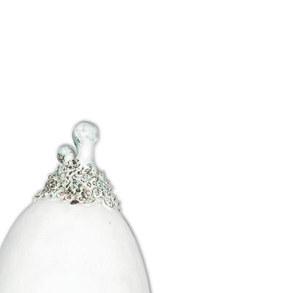

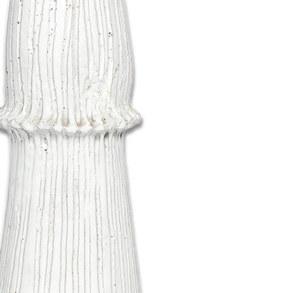














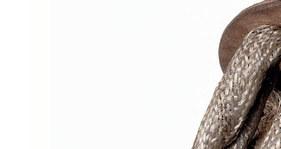

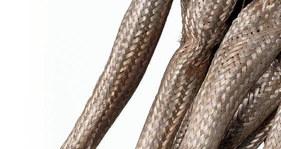






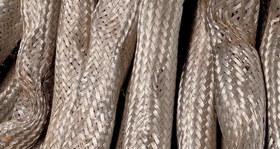
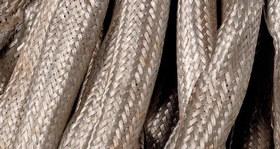
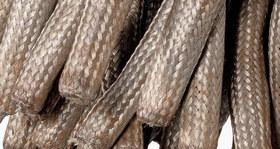
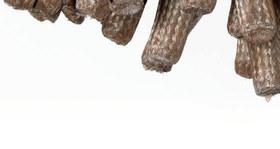


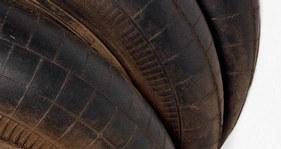
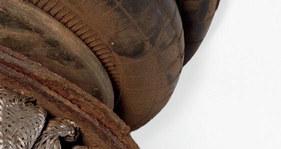

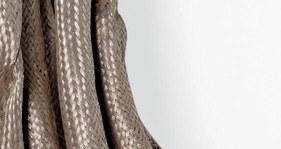
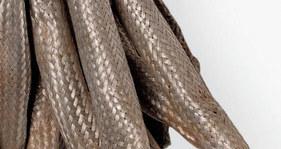






•
American Girl, 1974 etching and aquatint
15-5/8 x 19-3/4 inches
signed, titled, dated, and numbered 19/35
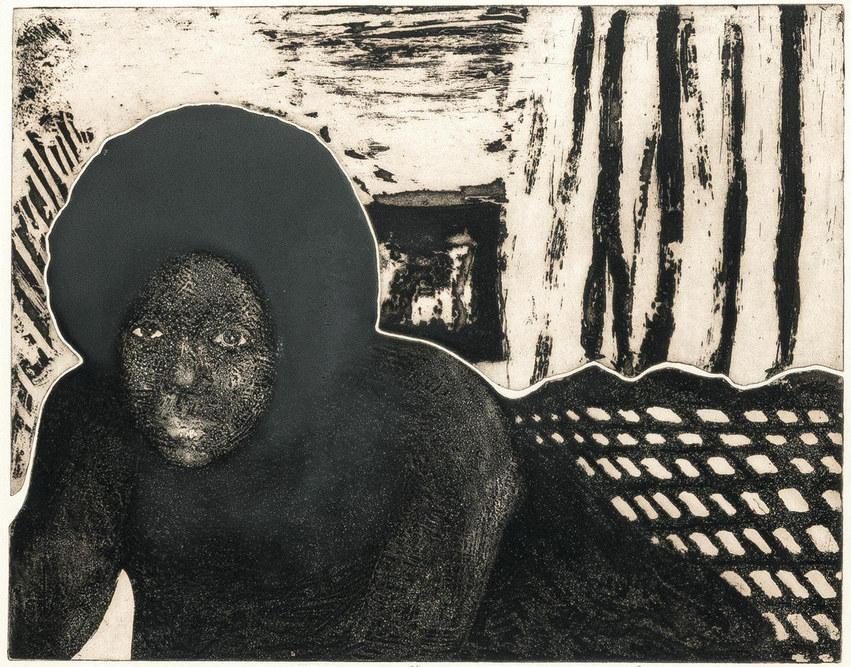



Mankato, 1968
acrylic on linen with collage element
24 x 24 inches
signed, titled, and dated verso

A Peace Piece, c. 1968-1970 mixed media collage on paper 18 x 24 inches signed; titled verso
From the Windows, 1995 mixed media collage 10 x 12 inches signed and dated


Ritual Bayou
(Byzantine Frieze), 1971
editioned collage (from an original set of 6)
color photo-lithograph mounted on finished plywood, as issued 15-1/2 x 20 inches
signed and numbered 24/75
Published by Sherwood Publishers, NY
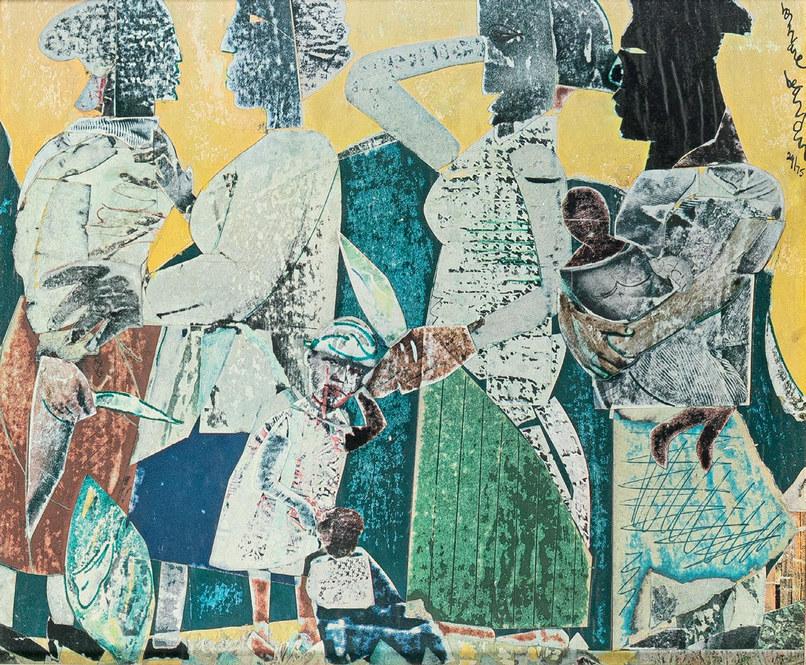


Ritual Bayou Series, Memories, 1971 editioned collage (from an original set of 6), color photo-lithograph mounted on finished plywood, as issued 15-1/2 x 20 inches signed and numbered 24/75
Published by Sherwood Publishers, NY
Ritual Bayou (Carolina Interior), 1971 editioned collage (from an original set of 6) color photo-lithograph mounted on finished plywood, as issued 15-1/2 x 20 inches signed and numbered 24/75
Published by Sherwood Publishers, NY
Jazz II Deluxe, 1980
color screenprint
26-3/4 x 37-1/2 inches, full margins
signed with A/P
Gelburd/Rosenberg GG#100

The Family, 1975 color aquatint and photo engraving 19-1/2 x 25 inches (sheet) signed and numbered, 138/175
Printed by the Printmaking Workshop, NY and published by Transworld Art, NY, with the blind stamp lower right. From An American Portrait, 1776-1976 GG#55A

untitled, 2004 acrylic on canvas
24 x 30 inches signed and dated

Awakening, 1974 carved and glazed stone
7-1/2 x 6-1/2 x 4 inches signed, titled, and dated
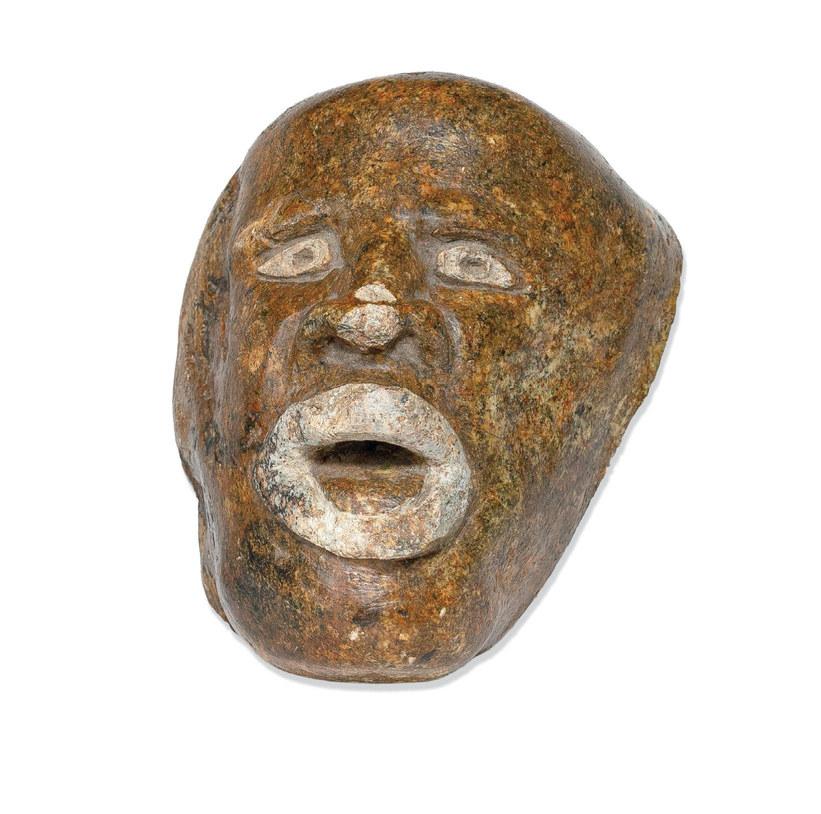
•
Five Children, Syracuse, NY, 1996
gelatin silver print
11 x 14 inches
signed and dated
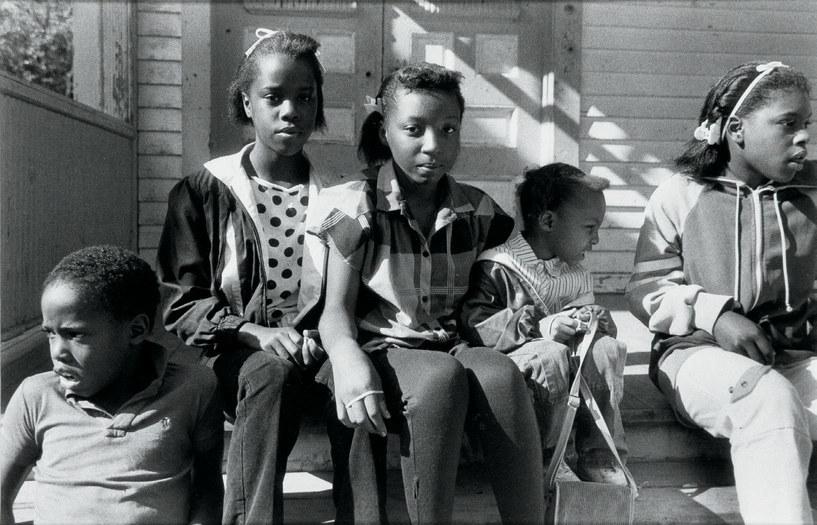
Interior, 1958 color lithograph on cream wove paper
11-7/8 x 8-7/8 inches, full margins 16 x 15 inches (sheet) signed and titled aside from an edition of 12
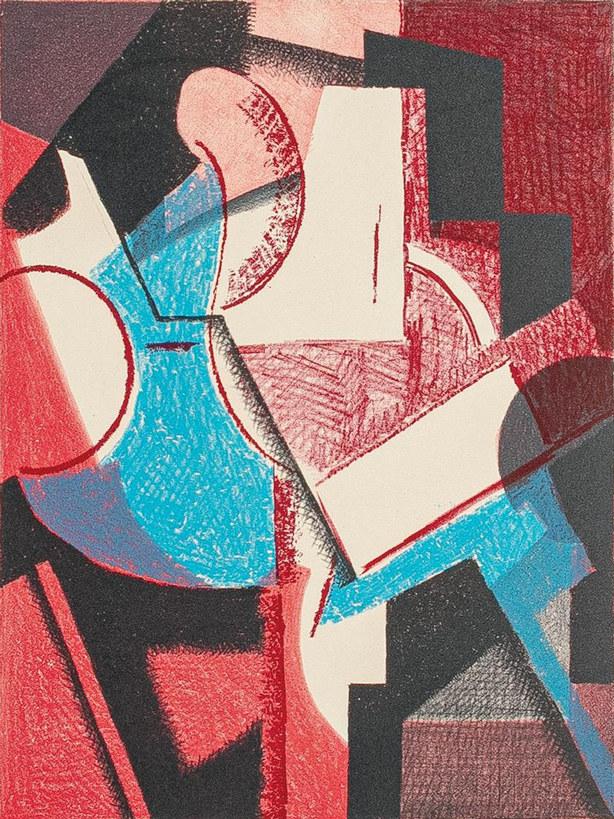
•
Quiet Instrument, 1958
color lithograph on cream wove paper
11-3/4 x 8-3/4 inches (image) full margins
22-1/4 x 15 inches (sheet) signed and titled aside from an edition of 10
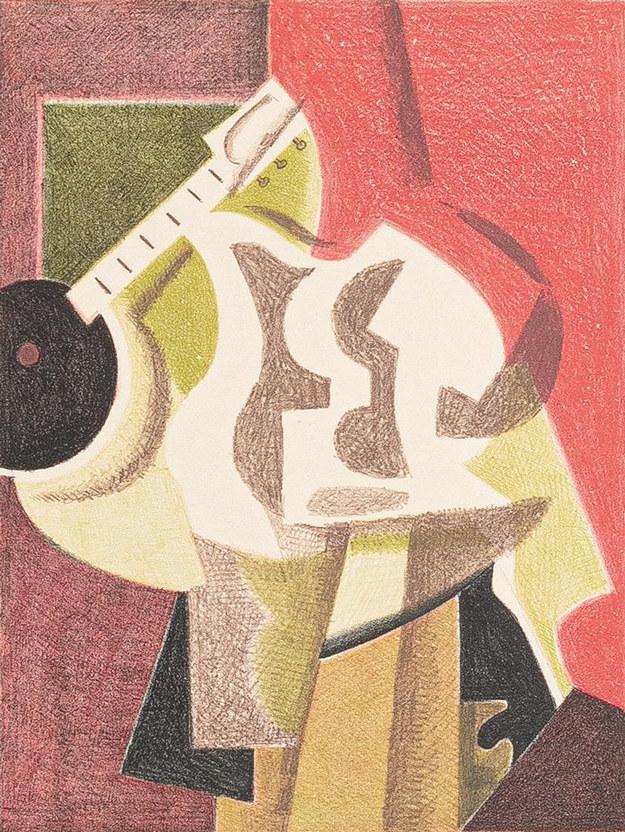
untitled, 1971 mixed media collage 12 x 10 inches signed and dated

untitled, c. 1980. watercolor and collage
30 x 22-1/2 inches
unsigned

Collection of the James T. Parker
Horseman, 1974 etching and aquatint on light cream wove paper 14 x 11-3/4 inches (image) full margins signed, titled, dated, and numbered, 19/35

untitled, 1986 found wood, foam core, acrylic 10-1/2 x 9 x 6 inches signed and dated

Face of Africa, 1956 original linoleum cut print 12 x 10 inches signed, titled, and dated
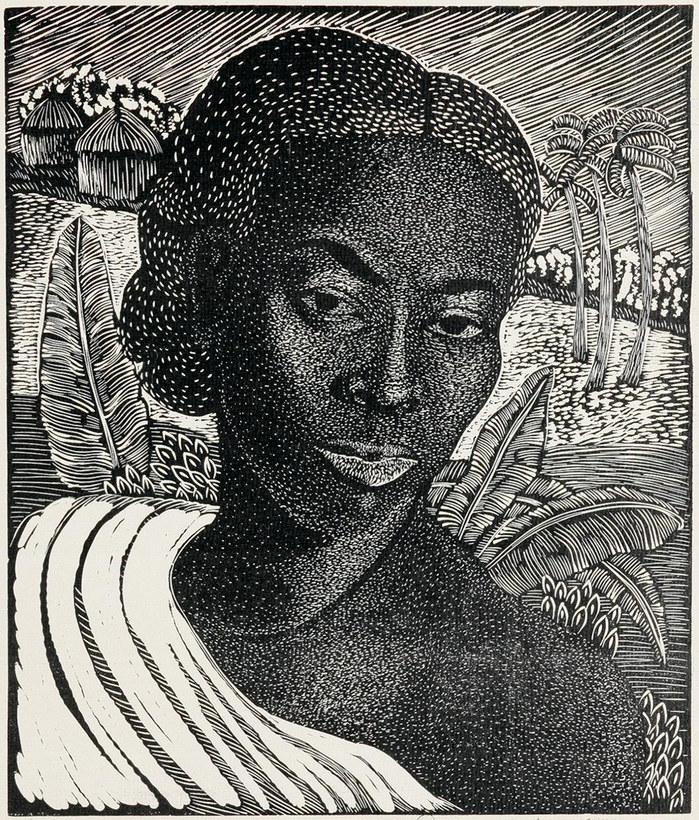
untitled, c. 1980 sculpture/assemblage
painted roofing tin and wood
9 x 13 inches
(base is 4 inches square)
unsigned (typical)

The Village, 1979 gouache on paper 14-1/2 x 19-1/2 inches signed and dated titled on label verso
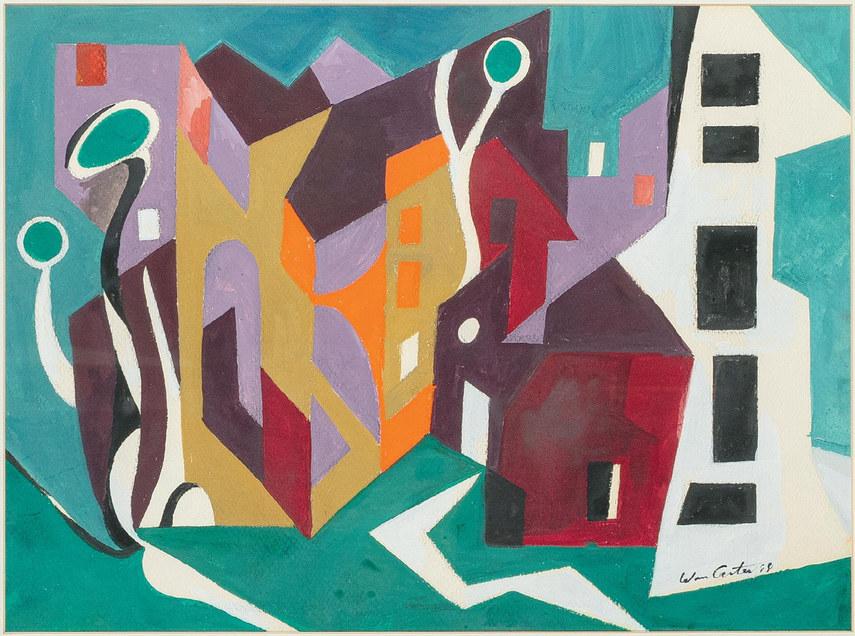
untitled, 1979 ink on paper
13-1/2 x 10-1/2 inches signed and dated
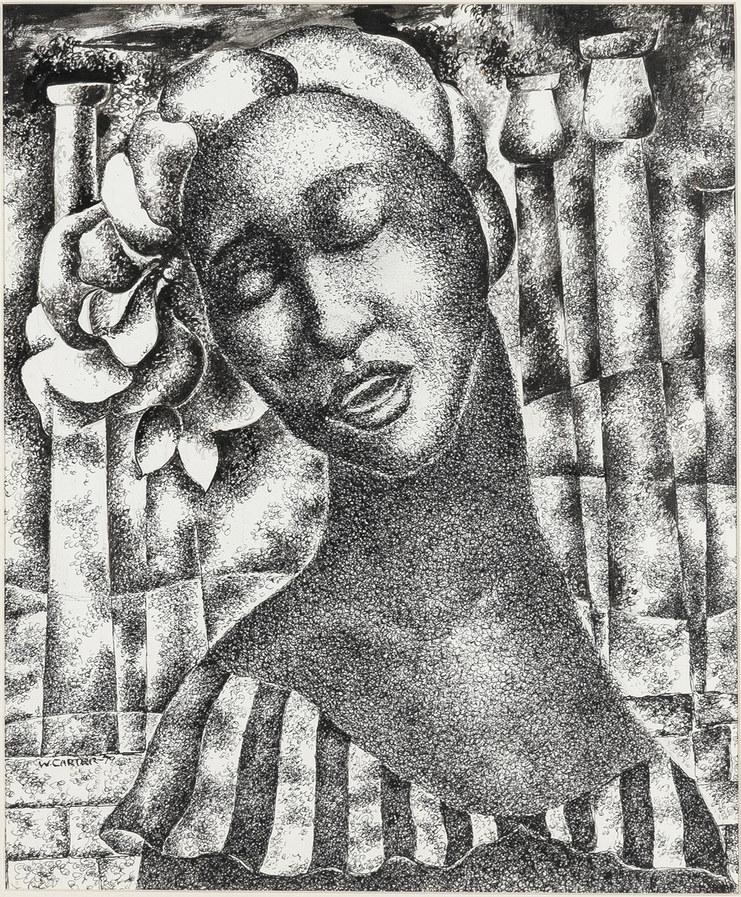

Cabeza Contando, 1960 bronze on a wooden base 9-3/4 inches (h)
initialed, E.C.
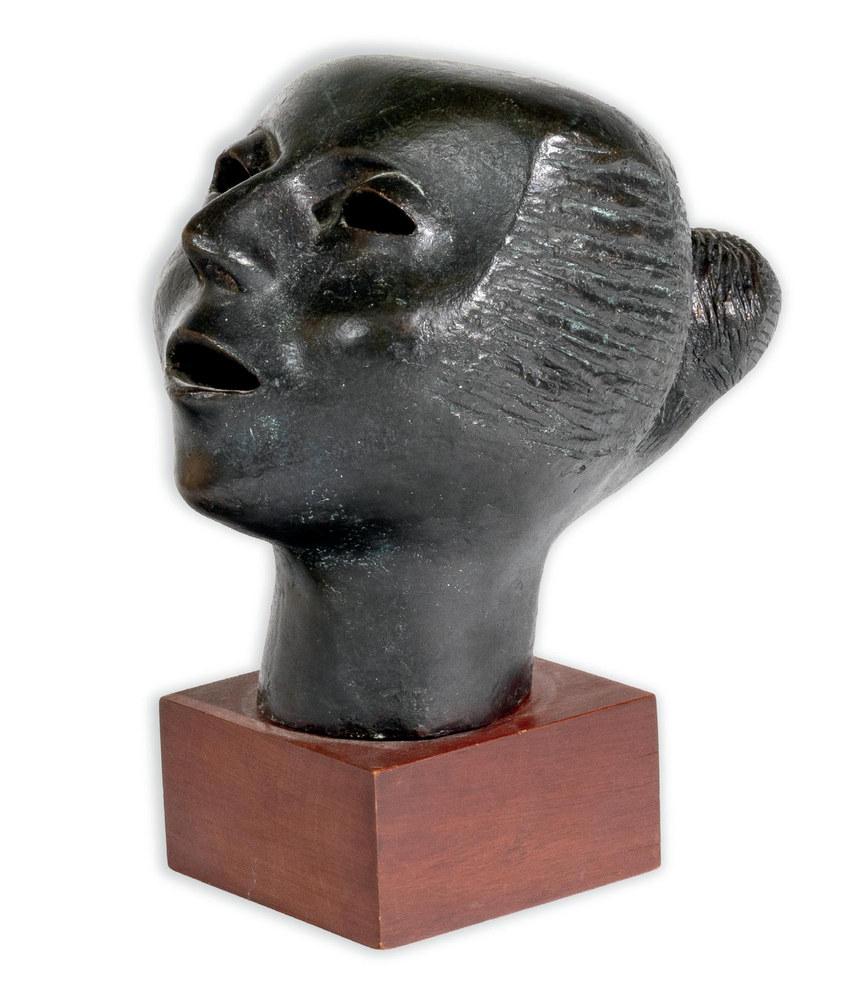
Cabeza Indigena, 1955 lithograph on wove paper 12-1/8 x 10-1/2 inches (image) 21-7/8 x 16-7/8 inches (sheet) signed and numbered 7/20 dedicated, To Hallie, with love

Akhmatova’s Monument, 1995
color offset lithograph
29-3/4 x 21-1/2 inches (sheet) signed, titled, and dated, with Paris, September 1995, and numbered 70/163

untitled (NY Series), 2004 acrylic on canvas 40 x 49-1/2 inches signed, titled, and dated verso label verso from Parish Gallery, Washington, DC

Yucatan Series, 1976-1977
color intaglio relief print on Arches paper
21-1/2 x 28 inches, full margins edition of 12
Printed by Robert Blackburn’s Printmaking Workshop, NY
Yucatan Series, 1976
color intaglio relief print on Arches paper
22 x 27-1/4 inches
signed, titled, and dated dedicated To Bob, with A/P
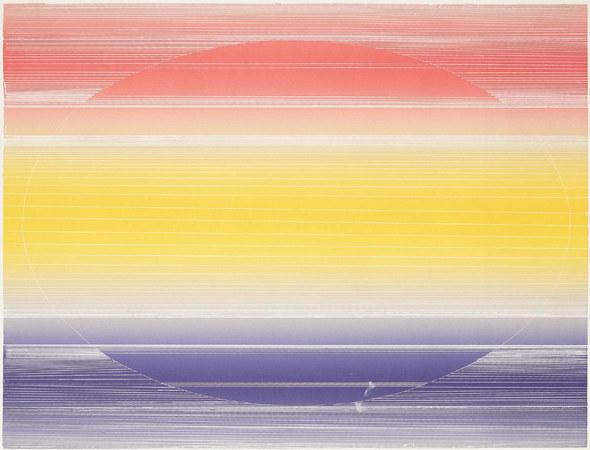

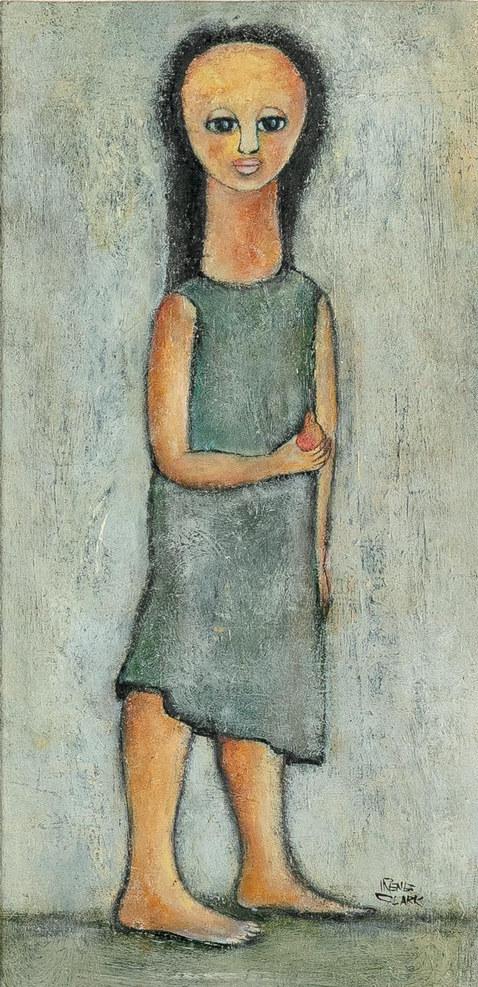
untitled, (Girl with Pear), c. 1950 oil on board 22 x 11 inches signed
E21000-TM, 1991 photolithograph with metallic powder additions and collage 41-1/2 x 29-15/16 inches edition of 30 with 6 additional proofs; inscribed R.I. Published by New Jersey State Council on the Arts, Rutgers Center for Innovative Printmaking, New Brunswick, New Jersey

Paintings I Promised Never to Paint: Man Crying, 1965 oil on canvas
12 x 14 inches signed and dated label verso: G.R. N’Namdi
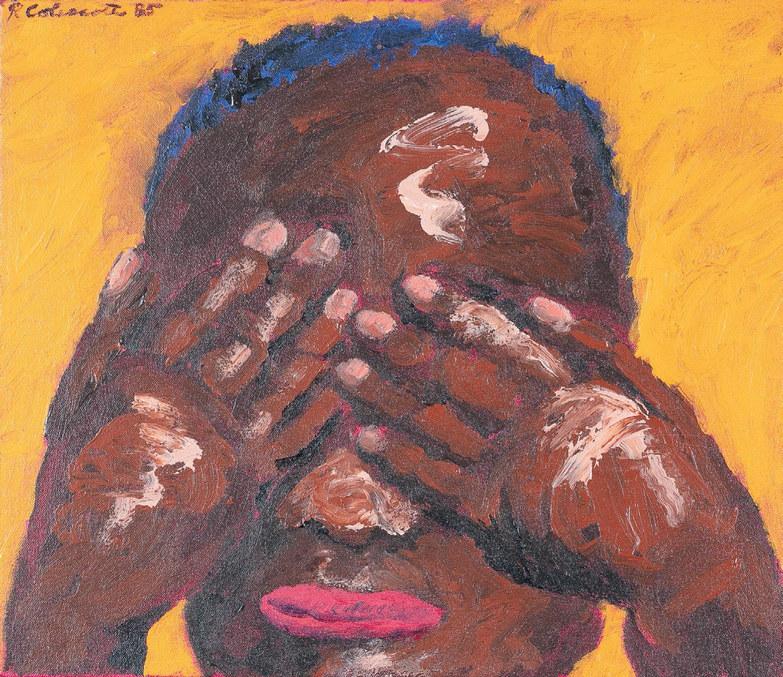
untitled, (Ladies in Waiting), 1986
charcoal drawing on paper
61 x 42 inches
signed and dated

Mask Series #9, 1977 pastel on paper 18 x 13-1/2 inches signed, titled, and dated

untitled, (Figure in Bedroom), c. 1945 brush, pen and ink on cream wove paper 11-1/2 x 8-1/2 inches signed

untitled, (Figure Composition), c. 1940 ink and watercolor on cream paper 22 x 15-1/2 inches signed

Young Worker, 1974-1975 color etching and aquatint 23 7/8x17 3/4 inches (image), full margins unsigned aside from an edition of 20

The Presentation, c. 1970 offset lithograph 21-3/4 x 16-3/4 inches (image), full margins signed and numbered, 58/150

Dancers (Floating Figures), c. 1965-1970
oil on canvas
24 x 30 inches
Zabriskie Gallery, NY inventory number verso
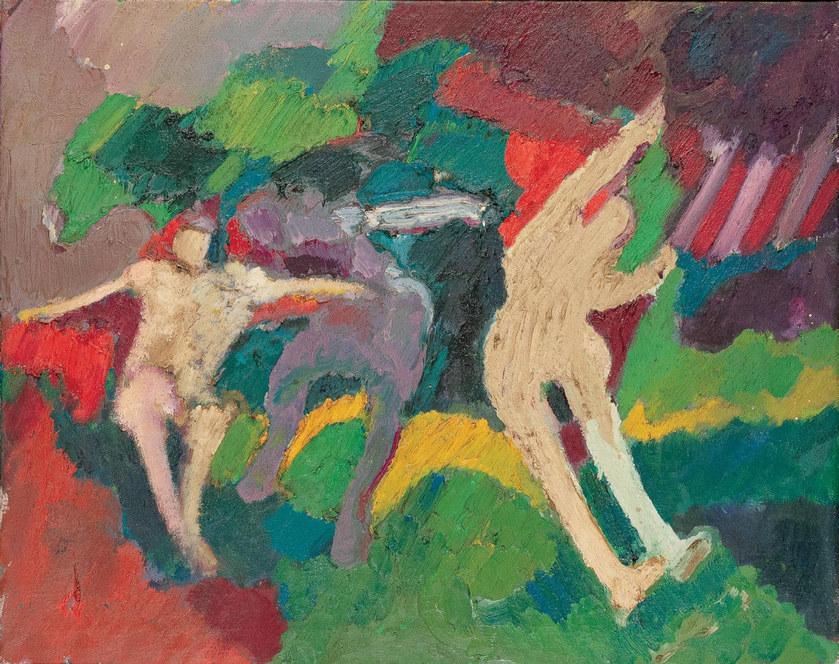
untitled, 1980 pastel on peach colored paper 19-1/2 x 25 inches signed and dated
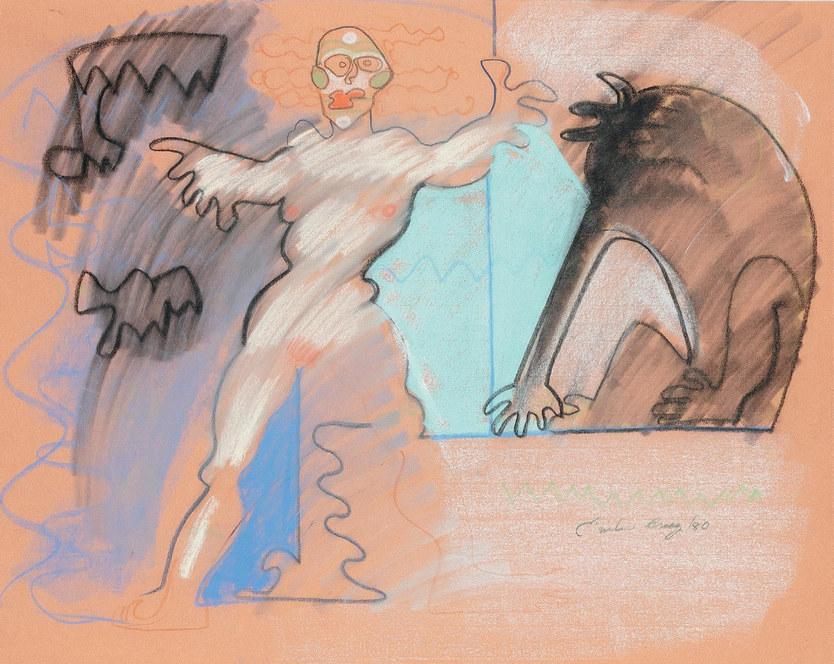
untitled, (Portrait of a Woman)
c. 1980
monotype with watercolor on tan paper
14 x 16-1/2 inches signed

untitled, (Still Life), c. 1940 oil on canvas board
28 x 20 inches (rounded corners) signed

Michelle Parkerson, c. 1990
watercolor, pastel and pencil on paper
34 x 27 inches signed
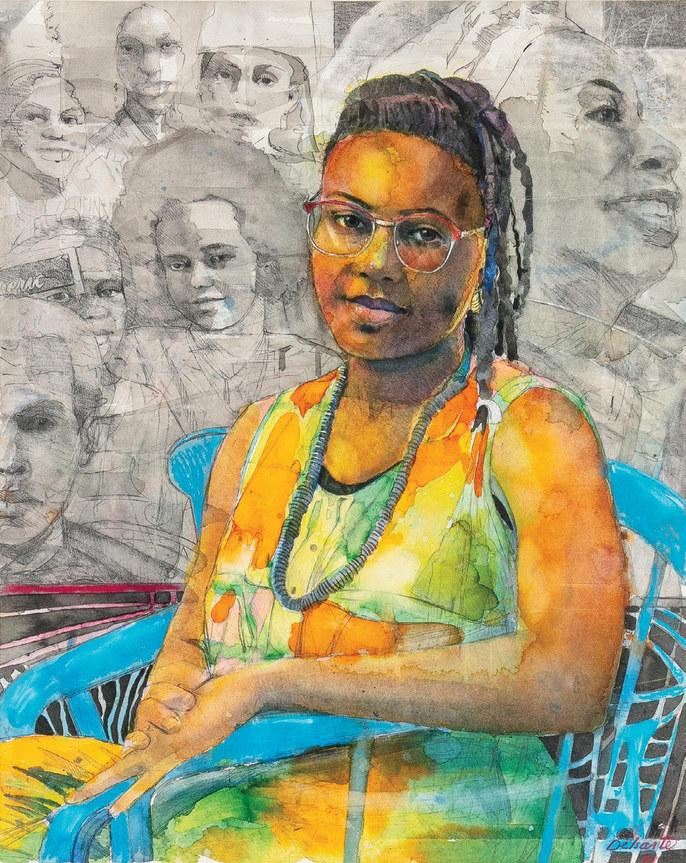
untitled, c. 1990 watercolor on paper 18 x 23-1/2 inches initialed
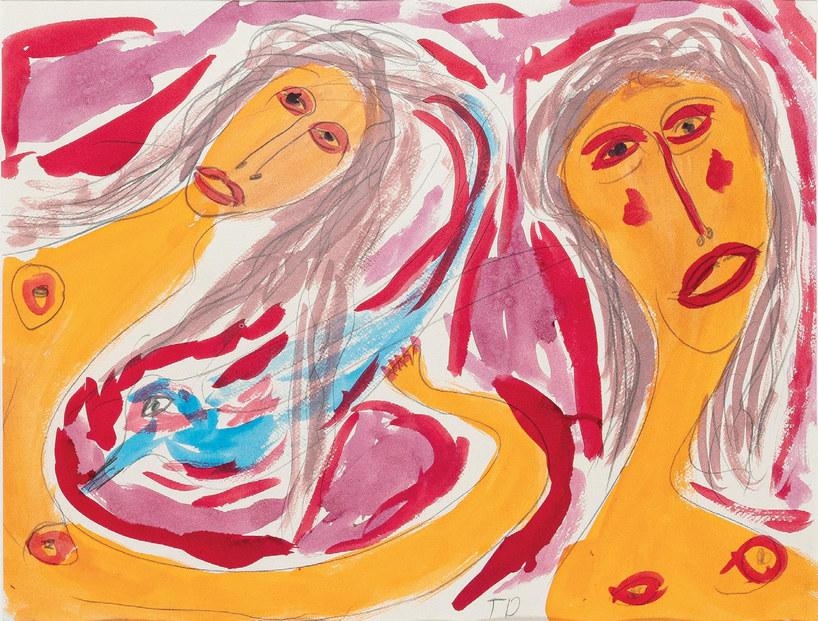
Sassy, 1981 color lithograph on Arches paper
30 x 22
signed, titled, and dated with AP

Doucement, 1980 lithograph 23-3/4 x 17-3/4 inches (image), full margins signed, titled, and dated, with AP

Spring Quartet III, 1975
watercolor on Arches paper
30 x 22 inches
signed, titled, and dated label verso from Dart Gallery, Chicago
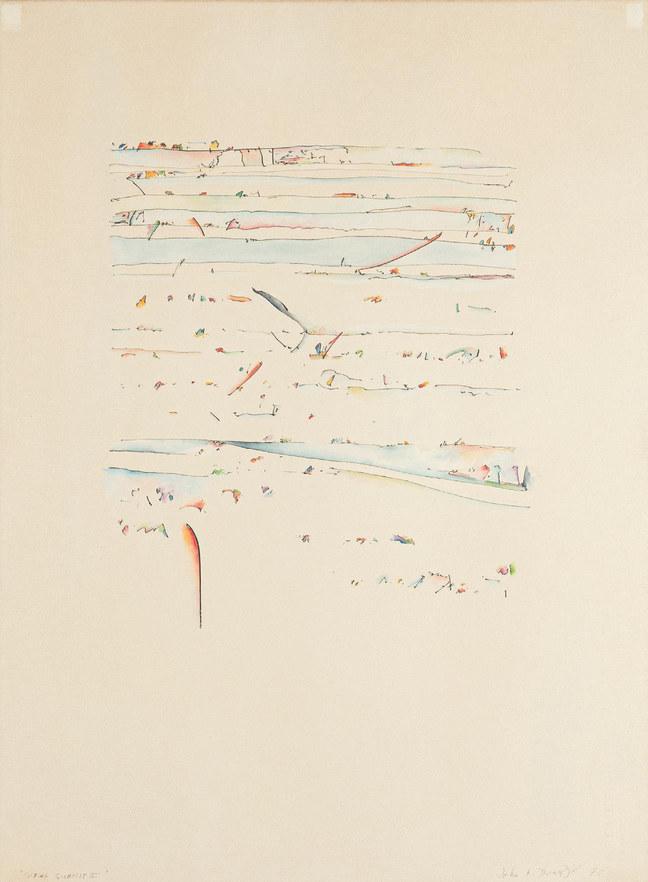
untitled, c. 1970s etching and aquatint 19-1/2 x 23-1/2 inches signed, with Working Proof written in pencil

untitled, 1994 enamel on cardboard 14 inches diameter signed and dated

untitled, 1994 enamel on Cornflakes box piece 12 x 8 inches signed and dated

untitled, 2010 oil on canvas
12 x 16 inches signed signed and dated verso
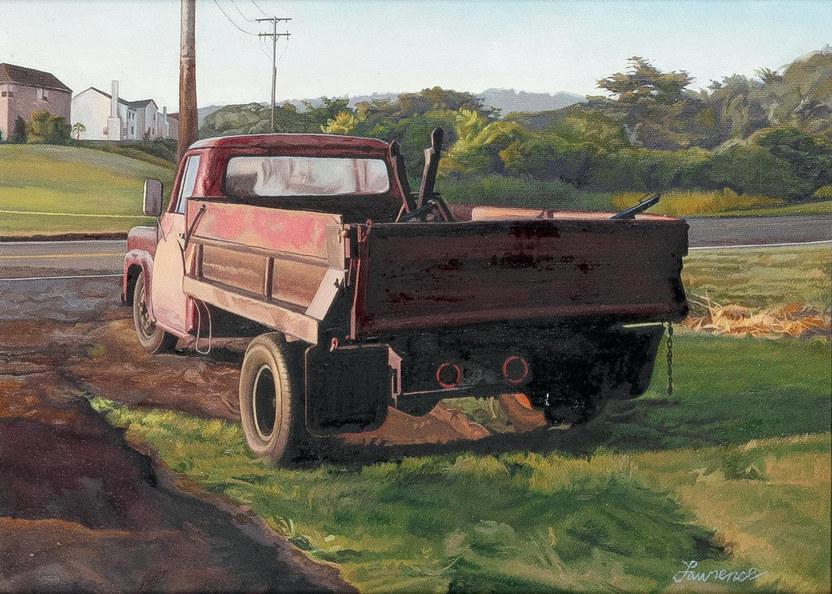
Shame, 1948 lithograph on Strathmore paper 10-1/2 x 8 inches (image) full margins signed, titled, dated, and numbered A/P, 2/2
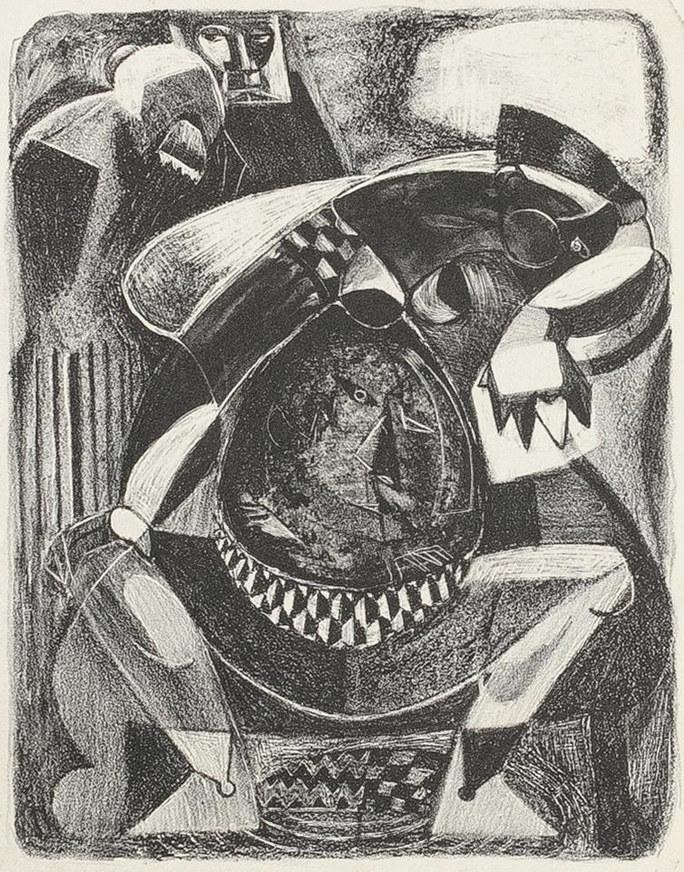
untitled, 1982 pastel on paper 16-1/2 x 24 inches signed and dated
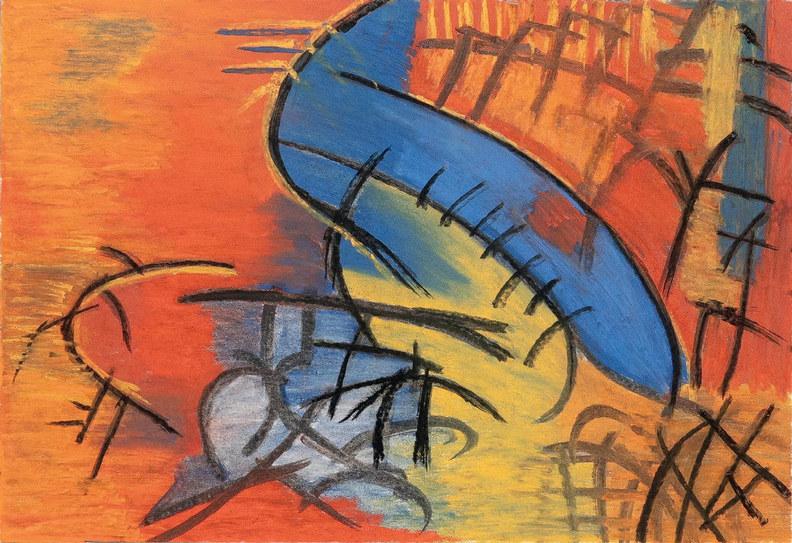
Hanover, 1975
acrylic with overlapping canvas on beveled stretcher
48 x 54 inches
signed, titled, and dated verso

untitled, (Mob Law), c. 1960 pencil drawing on paper 15 x 10-3/4 inches signed inscription by Margaret Burroughs under signature: 8/19/82, circa 1960, and initials

untitled, (Autumn Landscape), c. 1935 oil on board 8 x 10 inches signed
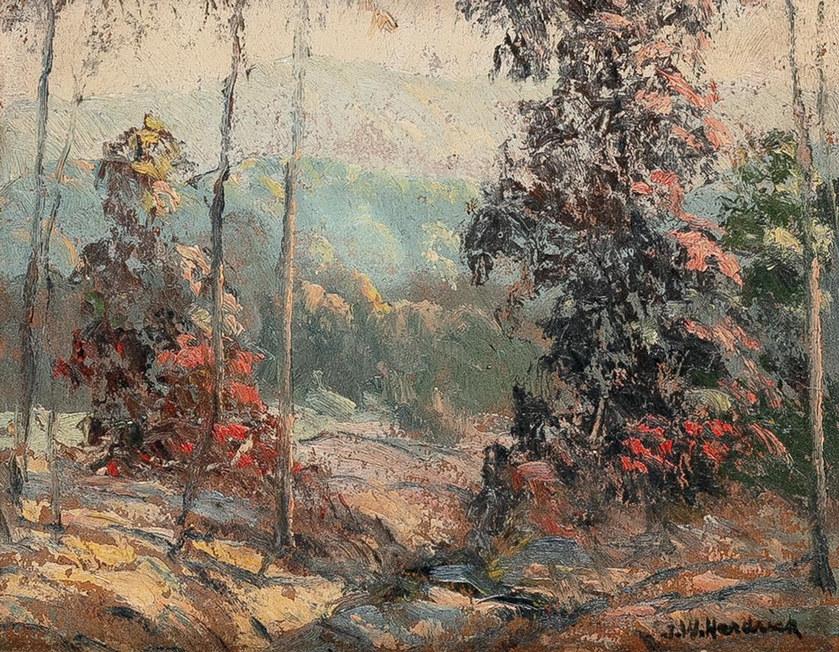
Floating, 1994 offset lithograph 21-1/2 x 30 inches signed, dated (7-1-94), titled and numbered 12/100 label verso from Rabbet Galleries, NJ

Black Boy, 1961 etching 18 x 10 inches signed, titled, and dated with artist proof
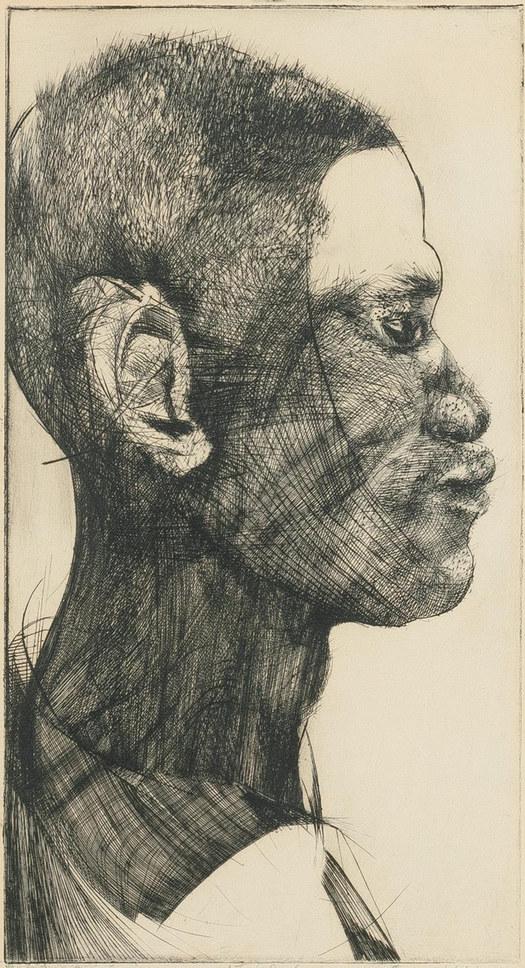
written by Halima Taha
The world of art collecting is often described in terms of possession, but for James Parker it was something far more expansive: a sustained act of stewardship, advocacy, and cultural affirmation. I first met Jim, the name used by the artists, colleagues, and friends who knew him, in 1999 after delivering a lecture in Chicago on the importance of collecting African American art. Our conversation revealed instantaneously that, for Parker, art was alive; a thread through history and community, culture and self. To enter his orbit was to join a story in progress, one in which every artwork became both memory and invitation.
Stepping into his world was like entering a living museum: the air alive with creative exchange, each work speaking to another across decades and disciplines. His home moved like a kaleidoscope, color and form constantly refracting into fresh harmonies and unexpected contrasts, at times like the improvisations of a jazz ensemble, at others as intricate and layered as an orchestra of voices. It was a genuine marketplace of ideas, where history, politics, beauty, and memory were exchanged under an everchanging light.
Parker’s sensibility was shaped in Chicago’s fertile soil, enriched by generations of Black artistic achievement.
WPA programs in the 1930s seeded the city with murals, sculptures, and public art, culminating in the founding of the South Side Community Art Center (SSCAC) in 1940, which served as both a sanctuary and launchpad. Artists like Charles White, Margaret Burroughs, Archibald Motley, and Gordon Parks represented a culture where creativity was inseparable from social responsibility. Chicago’s broader culture, the Chicago Defender championing Black achievement and excellence (founded by Robert Sengstacke Abbott (1870–1940), and Ebony magazine (featuring the photography of Moneta Sleet Jr. (1926–1996), instilled in Parker the belief that art documents struggle and affirms hope.
Parker entered collecting as a “story weaver.” From the mid-1960s onward, every acquisition became a living thread in a web of artist-to-artist, movement-to-history connections. His earliest acquisitions, a Charles White lithograph and an Elizabeth Catlett linocut, sparked his realization: he was not only curating his walls, but also preserving and amplifying histories. He asked of every new work, “How does this speak with what’s already here? Who might this inspire to dream, remember, or see anew? ” His collector’s instinct, always warm and inclusive, treated each piece as a legacy.

Parker nurtured sincere relationships with artists, cherishing how each one merged intellect, technical mastery, and cultural heart. His legendary friendship with Richard Hunt, America’s master of public sculpture, led to countless hours in Hunt’s metal-filled studio, their jazz-like exchanges reflected in Hunt’s lyrical abstractions.
Equally, transformative were years spent with Earl J. Hooks, Sr., whose modernist sculptures balanced echoes of African tradition with the clarity of contemporary form. As an educator, Hooks’s gifts extended through his mentorship, conversations with Parker regularly returning to issues of tradition, memory, and the artistry of labor.
Early acquisitions may have beautified Parker’s environment, but quickly his collecting became about research and community, about the chase for overlooked talent and the joy of archiving stories for the future. As his collection grew, so did his sense of duty. His home became not just a gallery, but a space for learning, fellowship, and creative possibility.
Parker conceived his collection as an “archive in motion”—a cross-generational conversation among Black artists, told across media. It opens with Henry Ossawa
Tanner’s etching Gateway in Tangier (c. 1905–10), among the earliest works here. From there, Addison Scurlock’s portrait of Robert Sengstacke Abbott (1870–1940), founder of the Chicago Defender, forges a direct bridge between Black portraiture and the Black press, one that carries forward to Abbott’s great-nephew, the Chicago photojournalist Robert “Bobby” Sengstacke, whose Civil Rights era images are well represented in the collection.
James Van Der Zee (1886–1983) raised the Harlem studio portrait to art, and the photogravure included in this collection, depicting a man in modern attire, possibly a magician, in shackles, presents a much stronger statement than the typical commissioned portrait. Taken in 1924, this image reveals the artist’s innovative use of props to create a provocative and controversial image.
Augusta Savage guided the Harlem Renaissance as both sculptor and mentor. Her sculpture, Gamin (1929), earned her a Julius Rosenwald Fellowship to study in Paris. When she returned to the U.S., she established the Savage Studio of Arts and Crafts, an important educational center in Harlem.
Dox Thrash (1893–1965) studied at the Art Institute of Chicago in the 1910s, but spent the majority of his career in Philadelphia. His deeply expressive images of working people and common scenes epitomized the feeling of much of the art produced during the W.P.A. He was best-known as a printmaker and co-invented the process of carborundum printmaking, an example of this is seen in the James T. Parker Collection titled, Old Barns (1937-1938).
Marion Perkins (1908–1961) gave modernist form to community struggle. Politics informed his work. He was a committed Marxist and intellectual and believed “art could convey ideas effectively only through recognizable imagery.” Parker’s collection featured three important carved stone sculptures, including a portrait of the artist’s wife, Eva Gillion, similar to the work included in the collection of the Art Institute of Chicago, and another work which is illustrated in the book, The Art & Activism of Marion Perkins. 1
Elizabeth Catlett’s artistic agenda, honoring strength and beauty seen in people of color is represented across the mediums of sculpture, painting, and printmaking in the collection.
The graphic work of Romare Bearden (1911–1988) is well represented in the collection. Perhaps the most interesting work is the Ritual Bayou series. Bearden set out to make an edition of collaged images from clippings of his own work, a sort of hybrid of multiple and original collage. Eventually, he realized the project was overly ambitious, and he abandoned it. Parker owned three of the six images in the series. “In Byzantine Frieze he presents images of Black women and children in a flat, orderly procession reminiscent of the mosaics of the Roman Empire. The
combination of the strong figures of the women with knives, blood, and other hints of violence demonstrates Bearden’s commitment to showing both the triumphs and tribulations of the African American experience, always with his eye to the history of art.” 2
Jacob Lawrence portrays important historical events in bold, modernist imagery with his two prints, Confrontation at the Bridge, a depiction of the march from Selma, Alabama to Montgomery (1965) to protest for voter’s rights, and the conflict, which occurred on the Edmund Pettus Bridge; and The Legend of John Brown (Harper’s Ferry), depicting John Brown’s seizure of the federal armory in 1859, hoping to acquire weapons and arm enslaved people. His group held the property and hostages for 12 hours before being defeated and imprisoned. Brown was eventually executed for his actions.
Norman Lewis (1909–1979) turned to abstraction for spiritual and social commentary by the 1940s. He began exhibiting at Willard Gallery in New York in 1946. Seascape (1952) retains its original label from the gallery. Ruth Fine, writing about his early 1950s abstractions exhibited at Willard in her book Procession, The Art of Norman Lewis, states
1 Perkins, Julia, et al., editors. The Art & Activism of Marion Perkins: “To See Reality in a New Light.” Third World Press : In Partnership with the Vivian G. Harsh Society, 2013: 25.
2 Grant Hamming, American Art Research Fellow. “Work of the Week: Romare Bearden, ‘Byzantine Frieze (from the Series Ritual Bayou)’ - Rollins Museum of Art.” Rollins Museum of ArtMuseum Blog, 28 Feb. 2022, blogs.rollins.edu/rma/2022/02/01/work-of-the-week-romare-beardenbyzantine-frieze/.
“Many of these soft abstractions rely on a limited palette, either monochromatic or employing one or two hues, generally in the same family, particularly reds, greens, tans, blues, and black.”
Quoting from a review of Lewis’ work, Fine writes “[his work is] a solo instrument making variations on a theme..as though colored lights were held in line behind their white cloth, attenuating prismatically and rectilinearly with the nap of the canvas; paint rubbed thin attains the effect of strange daytime stars birthed in chains of gypsy-fire intercommoning along in white darkness.” 3 Similarly to Lewis, the artist, Parker, the collector, acknowledged the significance of the shift away from Alain Locke’s New Negro Movement doctrines into the universalism of Abstract painting.
Alma Thomas and Sam Gilliam were both part of an informal group known as the Washington Color School, which initially took seed in the late 1950s in Washington, D.C. The consistent element seen in this group’s work is the form-making ability of true color. The James T. Parker Collection includes two works by Thomas, indicative of two of her typical composition styles, dating from the late 1960s: one, rectilinear vertical rows of contrasting color strokes, and the other, a more organic and unstructured composition, entirely dependent on color choices and arrangement to create the subject.
Thomas Sills (1914–2000) embodied improvisation in paint. Through his wife, mosaicist Jean Reynal, he met painters Willem de Kooning, Marcel Duchamp, Max Ernst, Arshile Gorky, Barnett Newman and Mark Rothko. Sills began painting in 1953, the year they married. In their home, he was surrounded by works by these artists, which influenced his own artistic endeavors. Encouraged especially by his wife and de Kooning, he began creating paintings, forgoing the use of brushes and applying paint with rags. By 1955, he had scored a one-person exhibition at Betty Parsons Gallery. Lawrence Campbell, an important art critic and author of Sills, says,
“To show at the Betty Parsons Gallery the artist must be, not seem, original.”4
Yaxchilan, the title of Sills’ work in the Parker Collection, refers to an ancient Mayan city. Sills and Reynal traveled extensively and he was fascinated with other cultures and history.
William T. Williams (b. 1942) brought jazz and urban rhythms to hard-edged abstraction. The untitled painting included in this collection dates from the late 1960s-early 1970s. Jacqueline Francis’ description of his work from this period is highly relevant:
“In the late 1960s, Williams’s acrylic paintings were hard-edge style abstractions, in which flat surfaces were
3 Fine, Ruth, and David Acton. Procession: The Art of Norman Lewis. Pennsylvania Academy of the Fine Arts ; University of California Press, 2015: 64.
4 Sills, Thomas, and Lawrence Campbell. Sills. William and Noma Copley Foundation, 1963.
activated by clashing colors and dynamic geometries, such as the diamond and the diagonal.” 5
Among women in the collection, Vivian E. Browne (1929–1993) was a deeply influential painter and printmaker, celebrated for her incisive explorations of identity, psychology, and social power; her expressive sensibility and fearless advocacy expanded possibilities for Black artists and helped shift the visual dialogue around race and gender. Her etching, Horseman (1974), seen in the Parker Collection, is also included in the permanent collection of the Whitney Museum of American Art.
Mary Reed Daniel (b. 1946) channels empathy and storytelling in her figural work. Daniel was born in East St Louis, Illinois and studied at Southern Illinois University. Suzanne Jackson (b. 1944) layers painting with transparency and rhythm, her early intimate work informed by nature. Her painting included in the Parker Collection attests to her interest of ecowomanism, a philosophy described by Melanie L. Harris as
“the reflective and and contemplative study of eco-wisdom that is theorized, constructed, and practiced by women of African descent…validat[ing] their lives, spiritual values, and activism as important epistemologies.” 6
Beverly Buchanan (1940–2015) commemorates rustic southern architecture and family in humble, powerful sculptures she produced from 1985 until her death. Her earliest examples, such as this one, dated 1986, are brightly painted and constructed of foam core and found wood.
The artist-scholars widen the archive’s reach. Richard J. Powell (b. 1953) is as celebrated for the historically-aware images he created as for his groundbreaking exhibitions and scholarship, rewriting the story of Black art. Powell first studied at Morehouse College, earning his B.F.A.; then he earned his M.F.A. at Howard University with a specialization in printmaking, a fact less widely known, before finally earning his PhD at Yale. Parker’s collection includes five amazing etching and aquatints, showcasing Powell’s talent as a visual artist.
Representation of photography from the second half of the 20th century is found in the collection as well. Dawoud Bey (b. 1953) is widely-known for his monumental, large-format color photographs that present Black subjects with profound dignity and depth, but his earlier work in a reportage style captured the rhythms and realities of city life in candid, streetwise scenes—a dual achievement that blended intimacy, narrative, and social terrain. Five Children, Syracuse, New York (1996) reveals the strength of this imagery.
5 Francis, Jacqueline. “William T. Williams.” St. James Guide to Black Artists, St. James Press, Detroit, MI, 1998: 547.
6 Harvey, Melanee C. “People, Nature, and the Spiritual World: The Ecowomanist Art Practice of Suzanne Jackson.” Suzanne Jackson: Five Decades, Telfair Museums, Savannah, GA, 2019: 116.
Seydou Keïta (1921–2001), legendary for his Bamako studio, rendered the middle class of Mali with clarity, pride, and artistic vision.
Rounding out the collection are sculptor and printmaking innovators such as Martin Puryear, whose forms meld modernism and the Black diasporic past, and Richard Hunt, the collector’s long-time friend, represented by five important sculptures and nearly twenty works on paper.
Walking through Parker’s home was to step into a continuously unfolding artwork; every sense activated in the act of seeing. The quiet gravitas of a photograph taken by Gordon Parks, might converse with Alma Thomas’s sparkling maximalism. The journey felt orchestral; a quick tempo among WPA galleries, a contemplative pause by groupings of photographs, energy building to the main collection’s contemporary crescendo. Parker conceived of art as an immersive, ever-changing experience that refuses to be silent or stagnant.
Parker was a master of visual matchmaking. His curation was both orchestration and alchemy: Alma Thomas’s jubilant mosaics facing Norman Lewis’s introspective abstraction, joy and contemplation joined in color. Narrative paired with abstraction, tactile improvisation beside elegant
geometry. Every juxtaposition, a pivot point, was an invitation to look longer, ask more, blend past and present anew.
In Black Art Auction’s October 2025 sale, the body of work on exhibit is both a culmination of Parker’s fifty years of collecting and a new point of departure for the art itself. More than just a dispersal, the auction functions as an historic event: historically re-centering long-overlooked figures like Augusta Savage, Beverly Buchanan, and Robert Colescott in the American canon; socially affirming the unbroken continuum of African American creativity, from WPA forerunners to today’s vanguard; and geopolitically mapping the breadth of the diaspora. It is Parker’s final act as story weaver—releasing a coherent body of work that remains both testament and roadmap for Black artistic vision.
In all my years writing about, advising, and appraising collections of African American art, I have rarely encountered a collector like Jim Parker. There was a profound quietness to his passion: understated, sincere, and private, he moved through the art world at a rhythm entirely his own. Where others sometimes broadcast their acquisitions or basked in openings’ glow, Jim inhabited a gentler, more interior tempo; a steady pulse attuned less to spectacle than intuition. Jim was that rare presence at an art fair or preview whose eyes would find the detail missed by the throng, who delighted not in the transaction
but in discovery. His joy radiated in new ideas and conversations, each piece a colored note in his ever-evolving mosaic.
It’s this singular harmony, this sense of making room for beauty and meaning, that will always stay with me. Jim Parker’s legacy is not just in the art he preserved, but in the lesson his presence quietly taught: that collecting, at its most profound, is a way of paying attention to art, to the world, to others, and to one’s own unfolding self.

If the course of Black Chicago art since the WPA is a river, then James Parker, like SSCAC, was its vigilant ferryman, guiding artists and audiences alike across time’s currents. His home was a living museum, a kaleidoscope, an orchestra, and a marketplace—a place where past and present worked together to imagine the future. As these works move into new homes, they carry James Parker’s warmth, intellect, and enduring conviction that art’s greatest power is to honor memory and spark possibility. %
the future. As these works move into new author of “Collecting African American
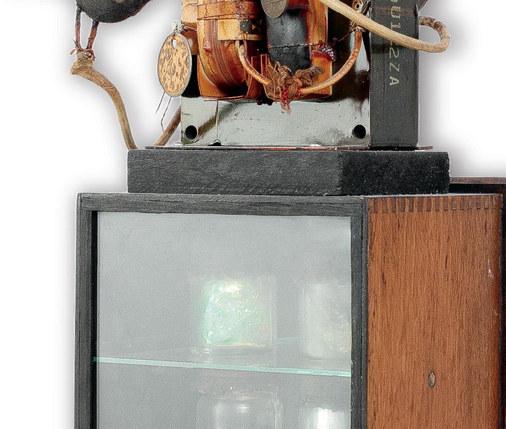
Halima Taha is a distinguished art advisor, curator, author, and appraiser specializing in African American art and culture. Best known for her pioneering work as the author of “Collecting African American Art: Works on Paper and Canvas,” she has spent over three decades providing expertise to museums, collectors, institutions, and artists nationwide.

Earl J. Hooks, Sr.
untitled, c. 1960
glazed ceramic sculpture
31 inches (h) signed




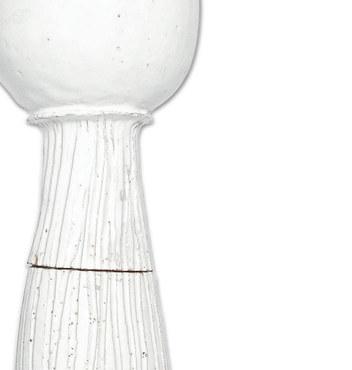






Hyde Park Alley, 1981 gelatin print 10 x 6-1/2 inches (image) signed and dated in pencil on mat and stamped verso
Exhibited: Alabama Art League, 52nd Annual Exhibition

Earl J. Hooks, Sr.
bowl, c. 1960
glazed ceramic vessel
6 inches high, 8 inches diameter signed underneath
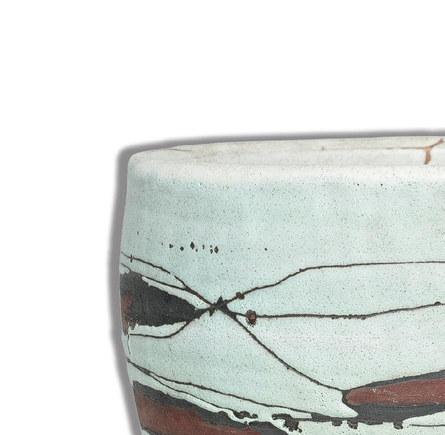

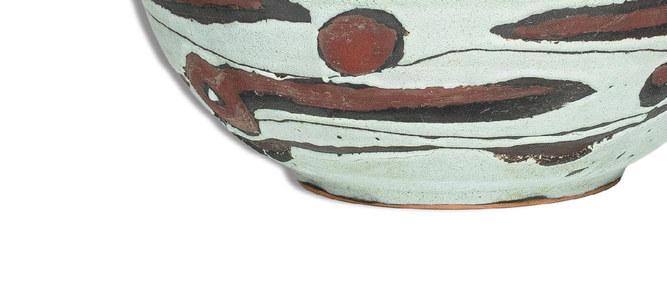

multi-pod vessel, c. 1960 glazed ceramic sculpture 9 x 13 x 10 inches signed underneath





untitled, c. 1960
glazed terra cotta vessel 8-1/2 (h) x 8 inches (diameter)

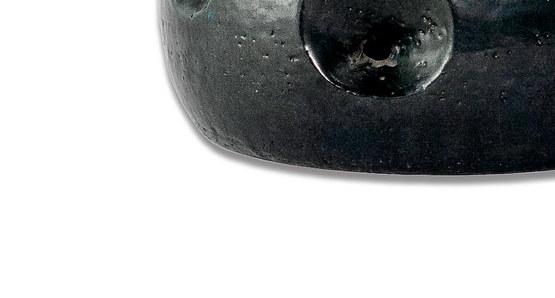


untitled, 1977 welded steel sculpture (repurposed car bumpers) 93 x 27 x 26 inches signed and dated
untitled,c. 1970 welded and painted steel sculpture
58 x 30 x 23 inches unsigned

untitled, (Ribbons), c. 1980s colored pencil and pastel on gray paper 19 x 23-1/2 inches (image) signed faintly in pencil lower left

The History of Her Life
Written across Her Face, 1991
color lithograph with collage element and various gold leafs 30 x 30 inches, full margins signed, titled, dated, and numbered 17/30
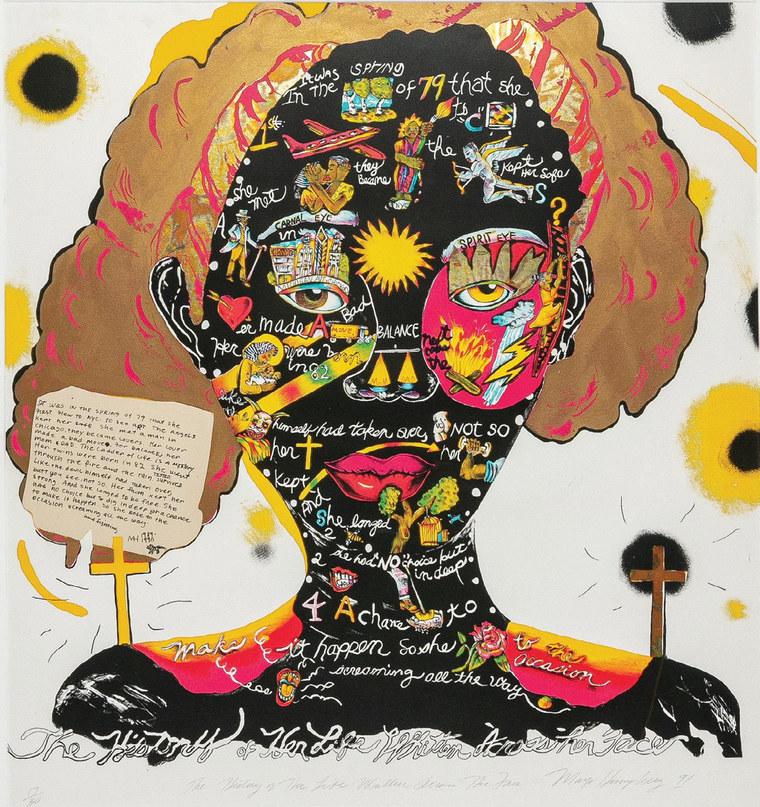

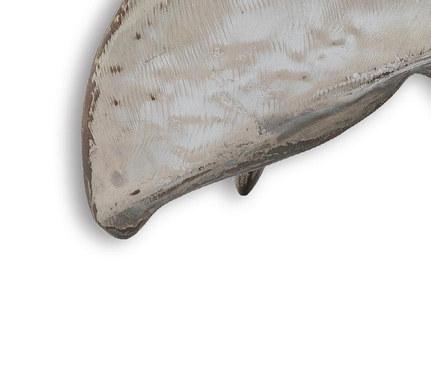
Natural Form No. 2, 1966 welded chromed steel 14 x 23 x 8 inches signed and dated
Exhibited: Somewhere There’s Music, An Exhibition Honoring Richard Howard Hunt; Visual Arts Gallery at Governors State University, August 24thSeptember 26th, 2015. University Park, IL.
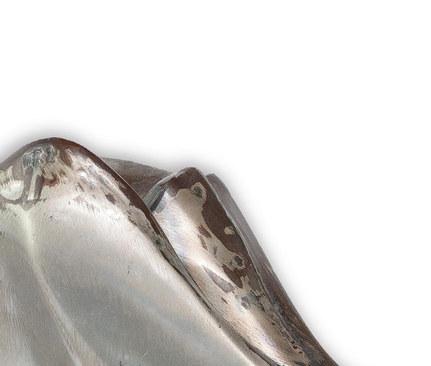


untitled (Wall Piece), 1961 welded chromed steel 46 x 16 x 10 inches signed and dated on interior; conjoined initials on exterior
Exhibited: Somewhere There’s Music, An Exhibition Honoring Richard Howard Hunt; Visual Arts Gallery at Governors State University, August 24thSeptember 26th, 2015. University Park, IL.
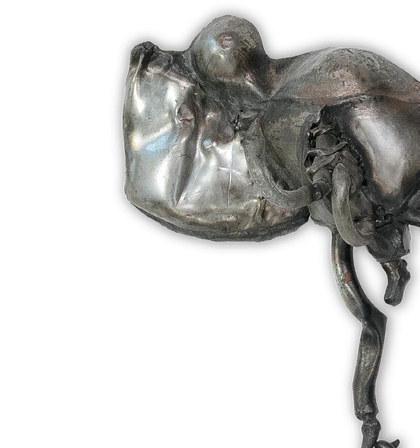




untitled, Hybrid Form, 1974 cast bronze 65 x 24 x 18 inches signed and dated with AP
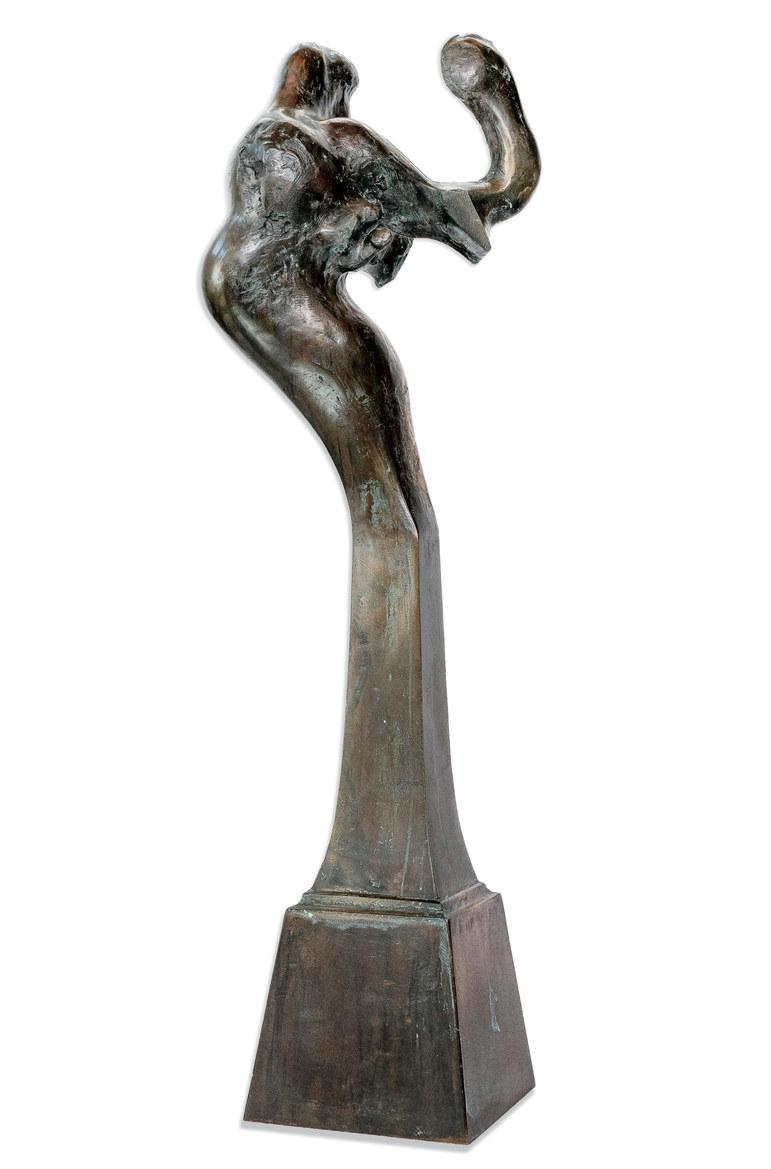
Exhibited: Somewhere There’s Music, An Exhibition Honoring Richard Howard Hunt; Visual Arts Gallery at Governors State University, August 24thSeptember 26th, 2015. University Park, IL.
Monument No. 2, 1964
welded and chromed steel
45 x 10 x 7 inches
signed and dated
Exhibited: Somewhere There’s Music, An Exhibition Honoring Richard Howard Hunt Arts Gallery at Governors State University, August 24thSeptember 26th, 2015. University Park, IL. ; Visual


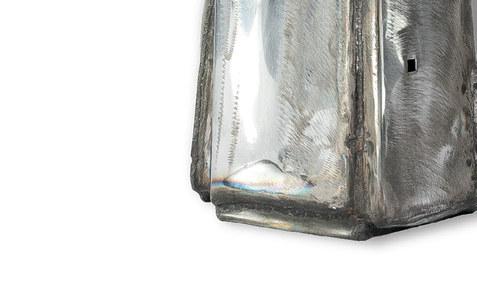


Sky Form, 1958 welded steel 31 x 32 x 12 inches signed and dated
Exhibited: Somewhere There’s Music, An Exhibition Honoring Richard Howard Hunt; Visual Arts Gallery at Governors State University, August 24thSeptember 26th, 2015. University Park, IL.


untitled, 1965
lithograph
30-1/4 x 22-1/2 inches
signed and numbered 5/20
Illustrated: Richard Hunt, 2022; Gregory R. Miller & Co., p.190.



untitled, c. 1965 color lithograph 15 x 15 inches signed, with artist’s proof untitled, 1965 color lithograph 15 x 15-1/8 inches (sheet) signed, with artist proof
untitled, 1990
oil stick on cream paper
29 x 39 inches (image) signed and dated
untitled, c. 1975
color lithograph
22 x 29-1/2 inches (image) full margins signed, with A/P


Welkin Series #10, 1977 acrylic on paper 22-1/2 x 29-1/2 inches signed; signed, titled, and dated verso, New York, 1977

Eating-New York, 1977
watercolor on illustration board
20 x 15 inches
signed; signed, titled, and dated on verso in pencil
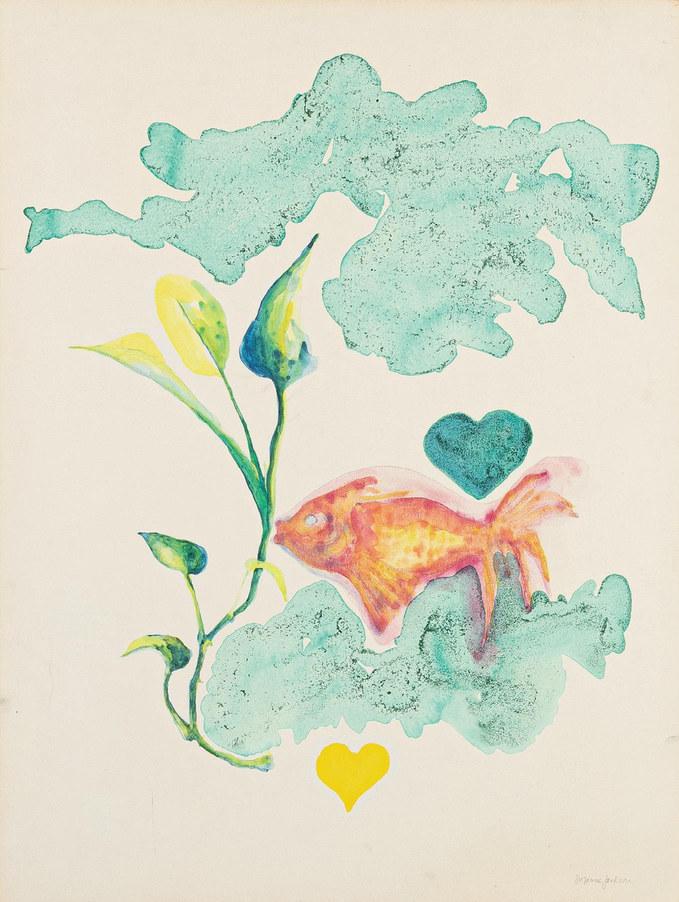
Collection

untitled, (The Unicorn)
c. 1955
oil on canvas
8 x 10 inches signed

The Girls from Mali, 2001 gelatin silver print 18-7/8 x 13-3/8 inches signed, dated in the margin; numbered verso 5/100

Confrontation at the Bridge 1975
color silkscreen on Strathmore paper
19-1/2 x 25-3/4 inches
signed, titled, dated and numbered 34/125

Legend of John Brown # 20, John Brown held Harper’s Ferry for 12 hours. His defeat was a few hours off, 1977 silkscreen print on Domestic Etching Paper through hand-cut stencils 14 x 20 inches (image) 20 x 25 7/8 inches (sheet) signed, dated, and numbered 31/60, inscribed no. 20

untitled, c. 1975
acrylic on canvas
34 x 18 inches
signed

Carnaval, 1974 etching and aquatint with embossing
19-13/16 x 12-3/16 inches (plate)
30-1/16 x 22-1/4 inches (sheet) signed, titled, dated , and numbered, 25/35
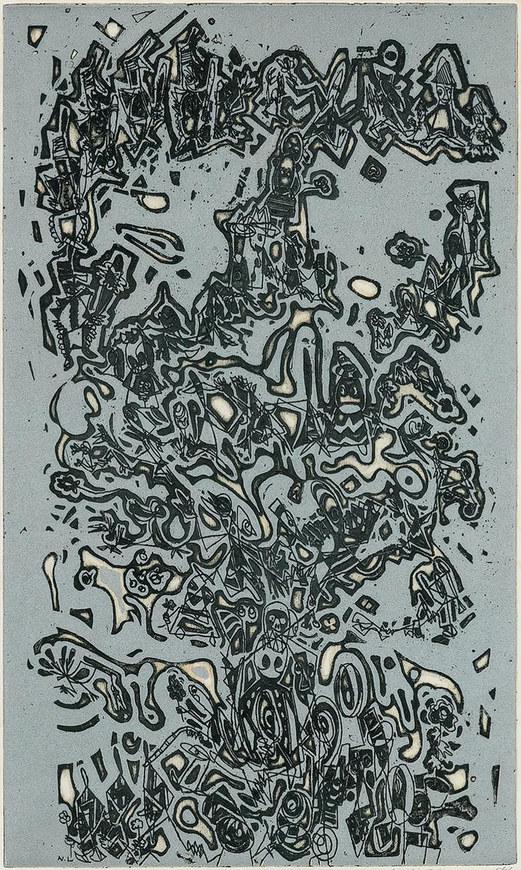
From a portfolio of seven etchings by various artists
Printed and published by Printmaking Workshop, NY
Seascape, 1952 oil on canvas
12 x 26 inches signed and dated Willard Gallery label verso with title
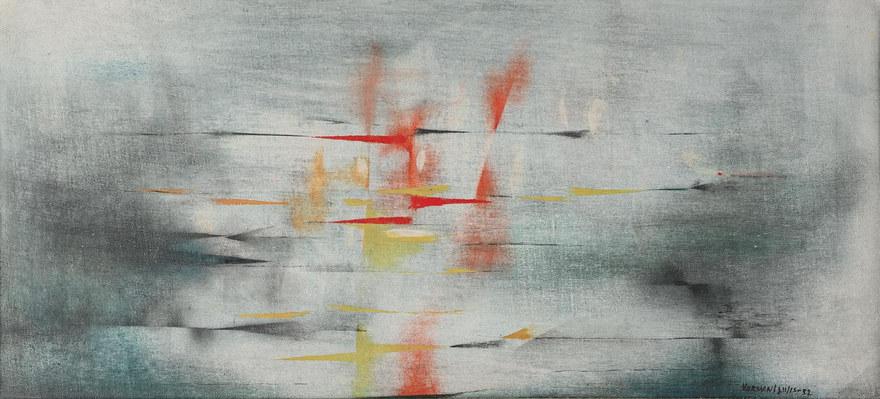
Counter Intervention, 1954 oil on paper 19 x 24 inches (sheet) signed and dated
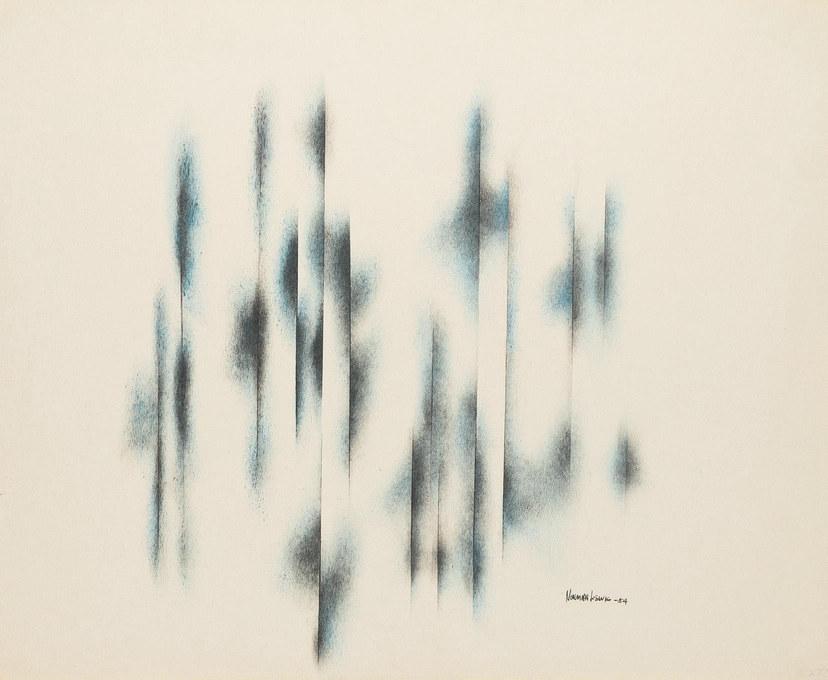
Compositional Study for SOB, SOB, 2002 graphite and charcoal on paper 24 x 19 inches (sheet) signed and dated

Everything Will Be Alright..., 2004
woodcut and screen print on grey BFK Rives paper
27 x 41-1/2 inches (image)
30 x 44 inches (sheet) signed, titled, dated, and numbered, 2/25
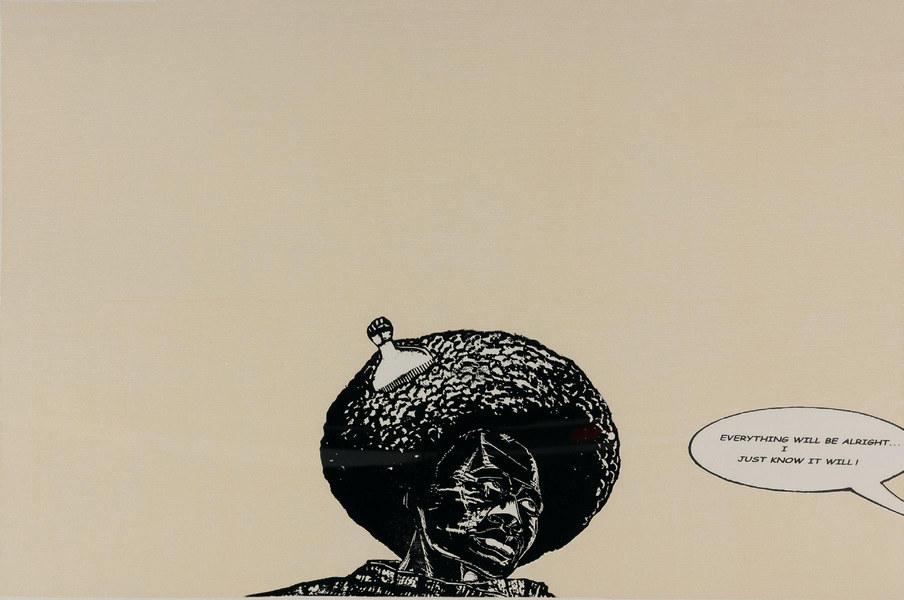
•
Keeping the Culture, 2011 color linoleum cut and screenprint on Arches paper 17-1/2 x 28 inches signed, titled, dated and numbered 18/100

untitled, c. 1990 pencil drawing on paper 14 x 20 inches signed

untitled, c. 1975
acrylic on canvas
12 x 9 inches signed

Apples With Cup, 1999 oil on paper 16 x 20 inches signed and dated label verso with title

untitled, 1964 color lithograph 16 x 10-1/4 inches (image) full margins signed, dated, and numbered 10/15
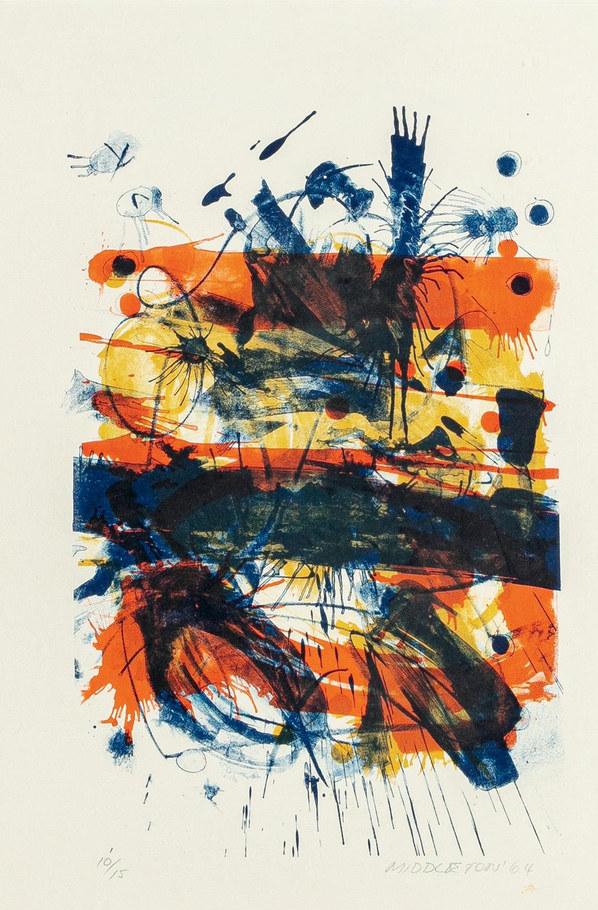


Organized Opposition
Strange Amalgamation
Complete Isolation 2005 suite of three works etching, aquatint and mixed media works
10 x 10 inches (each) each signed, titled, dated, and numbered 5/20

American Gothic, Washington, D.C., 1942 (later imp.)
silver print
9-1/3 x 6-3/4 inches signed
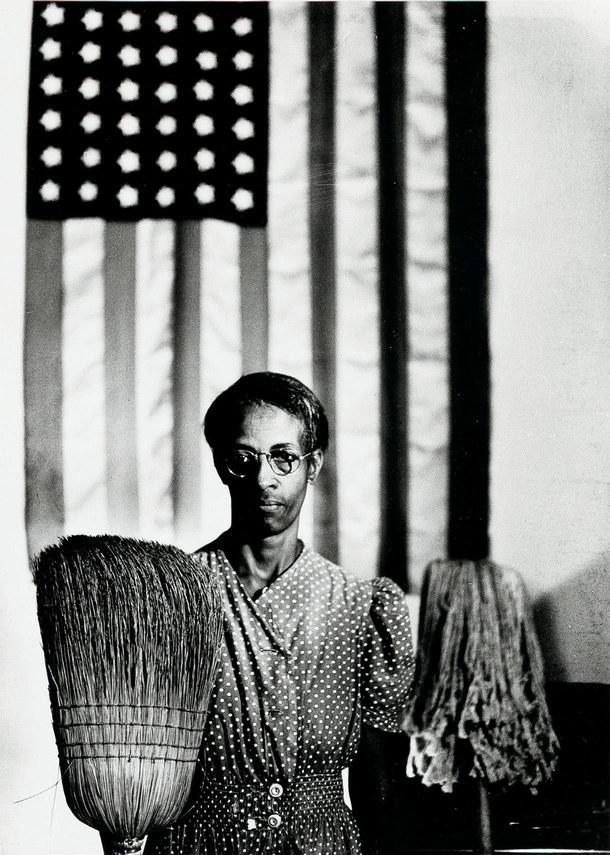


8 x 6-1/2 x 7 inches








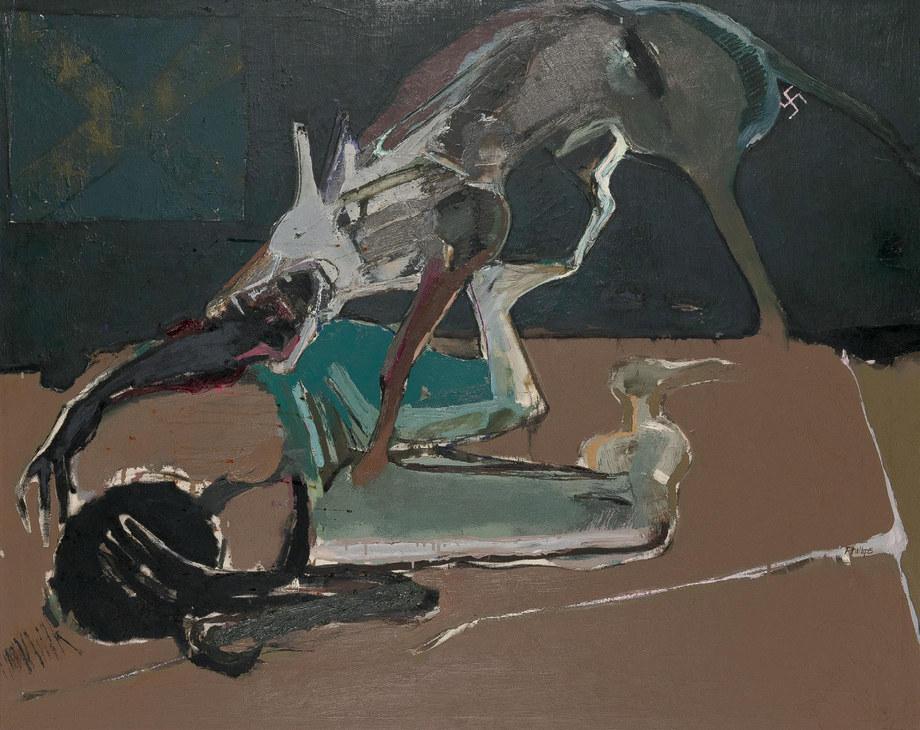
untitled (Standing Nude)
c. 1940
brush ink on brown paper
12 x 9 inches signed


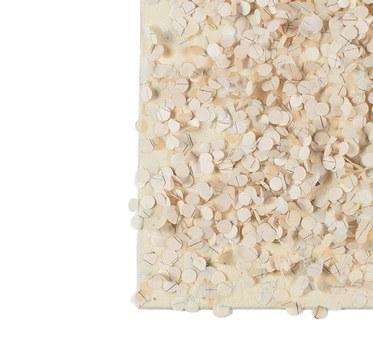
Untitled 50, 1974
pen and ink, tracing paper and powder on illustration board with supporting structure verso, housed in its original plexiglass shadow box 9 x 14 inches (image) 16 x 20 inches (board) artist and gallery labels verso stamped, Howardena Pindell (with address)




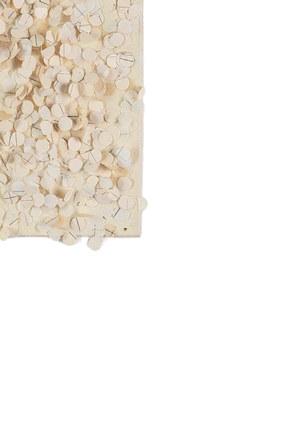
American Negro Exposition Poster, 1940 serigraph on poster board
21-1/2 x 13-3/4 inches signed in the plate
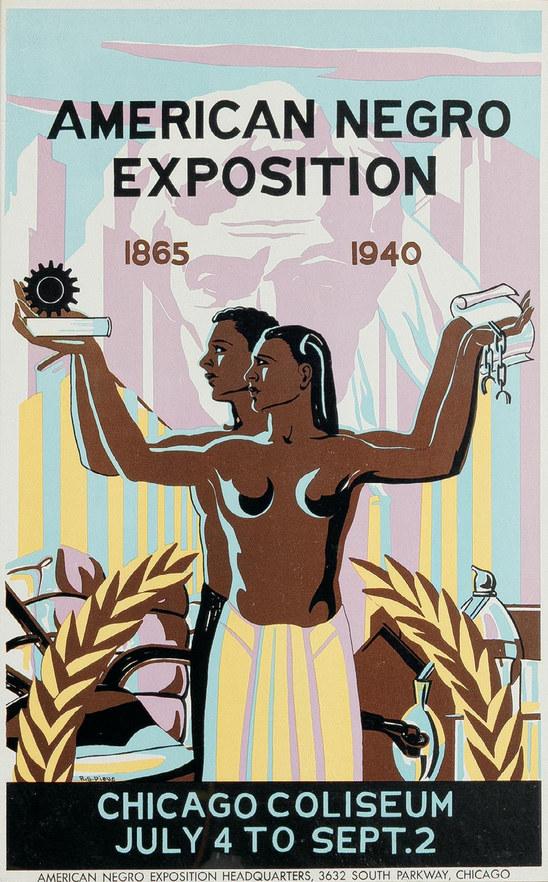
Richard Wright Series #1: Good Boys Do Not Cry for Love, 1976 etching and aquatint 17-1/2 x 17-1/2 inches full margins signed, titled, and dated annotated with Working Proof

Steppin in Tall Cotton, 1980 etching and aquatint
24 x 17-1/2 inches (image) full margins signed, titled, dated, and numbered 3/15
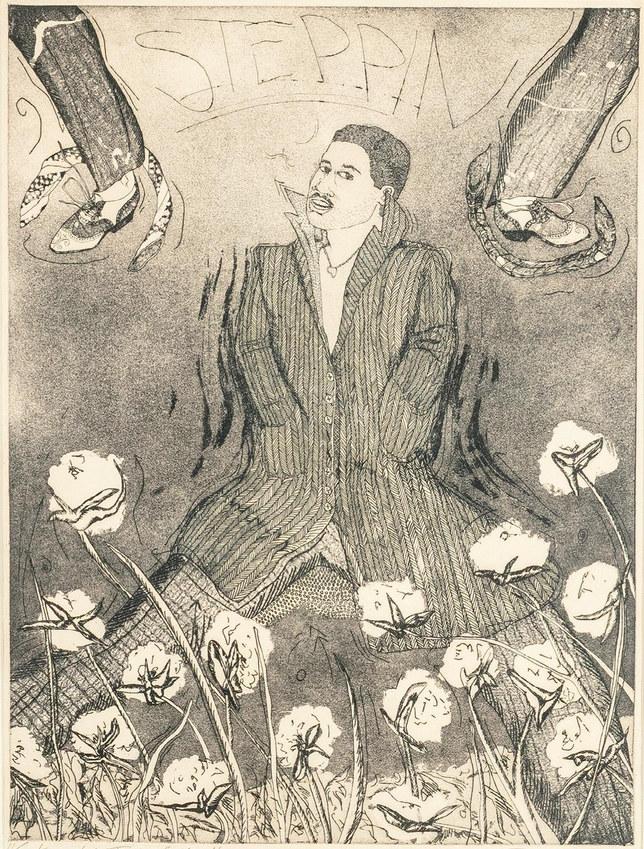
Narrations:
Tableau Vivant, 1978 etching and aquatint on cream wove paper 17 x 23-3/4 inches (image) full margins signed, titled, dated with A/P

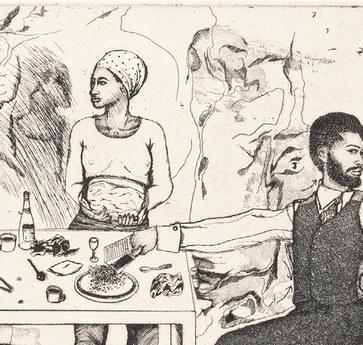
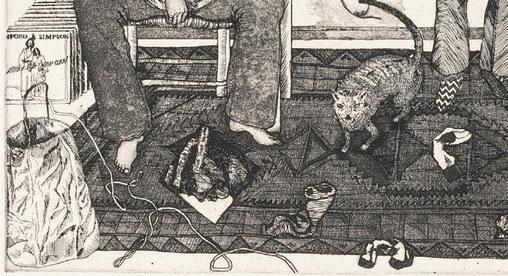


untitled, 1987
coated bronze
18 x 14 x 10 inches edition of 5


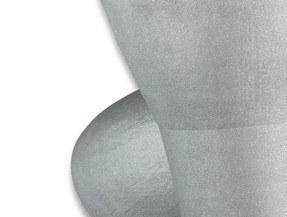



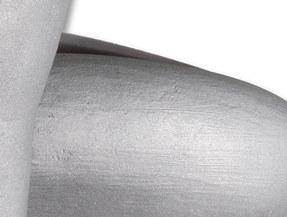

Becky (from Cane), 2000 woodblock print on cream Japanese handmade paper (katakana) 10 3/8 x 12 3/4 inches (image) 16-3/4 x 20-1/2 inches (sheet) signed, titled and numbered 13/50 Donald Young Gallery label verso

untitled (New Year), 1975-1976
lithograph
5-1/2 x 11 inches (image) full margins
signed, numbered 16/35, and inscribed in pencil verso: I wish that 1976 will be one of your very best years, Mavis.

Landscape Near St. Ferme, 1991 watercolor and pencil on Arches paper
30 x 22-1/4 inches signed, titled, and dated

Black Snake Blues, 1994 offset color lithograph on wove paper
21-3/4 x 29-3/4 inches (sheet) signed, titled, dated and numbered 26/70
Printed and published by the Brandywine Workshop, Philadelphia, with the blind stamp lower left.
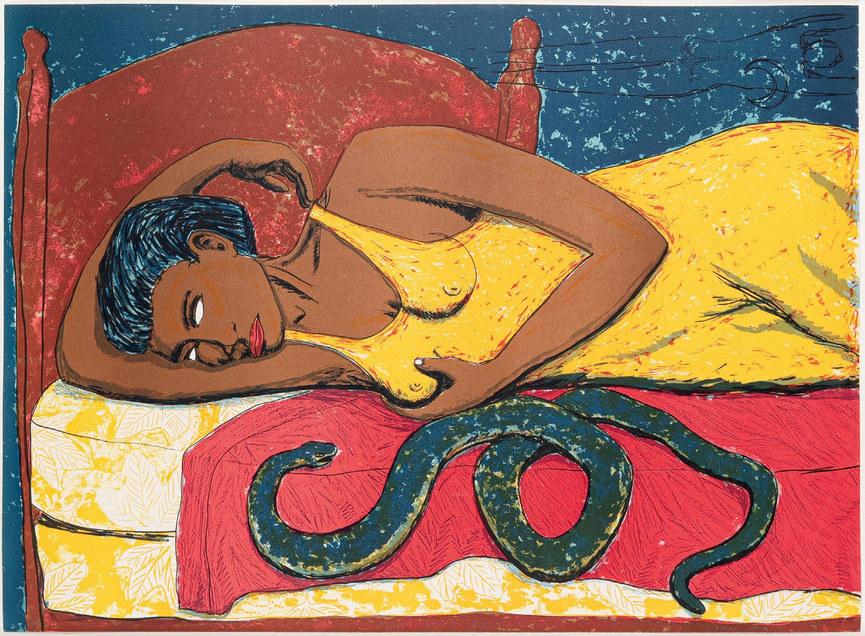
L.A. Energy (Mural Site: 5th Street between Flower and Grand), 1983 color lithograph
23-3/8 x 17-1/4 inches (image) 28-1/2 x 22-1/4 inches (sheet) signed, titled, dated, and numbered 16/20

Beach Hat, c. 1960
pastel on paper
13-1/4 x 17 inches
signed and titled

untitled, 1965-1975
color lithograph and offset lithograph with collage 29 x 23-1/2 inches
artist’s ink stamp signature inscribed in pencil in left and right corners of paper: 38-75 (edition)

Gamin, 1929 plaster with bronze painted patina 9 inches (h) signed and titled




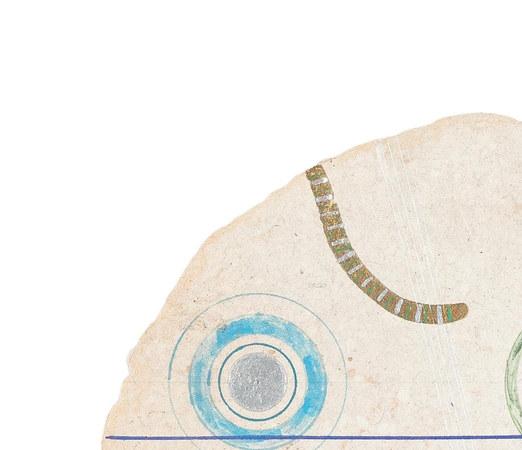
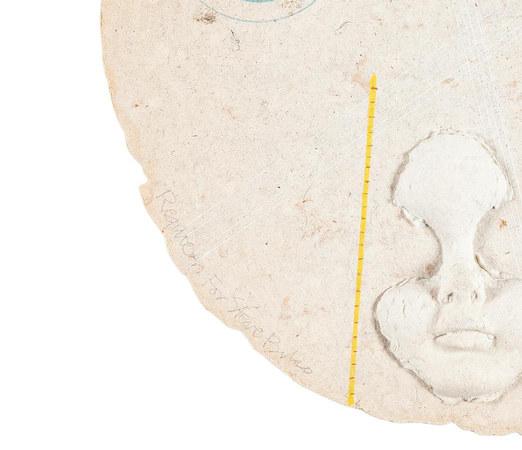
Requiem for Steve Biko, c. 1990 mixed media collage in tondo (paint, stamp, plaster cast) on thick paper 9-1/4 inches diameter signed and titled

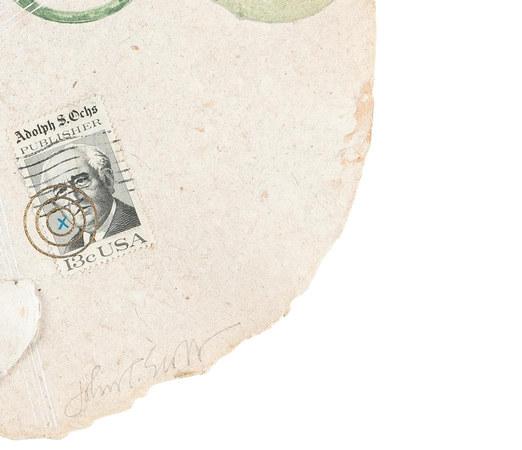
The Citadel, Haiti, c. 1930 oil on canvas
18-1/2 x 22 inches signed
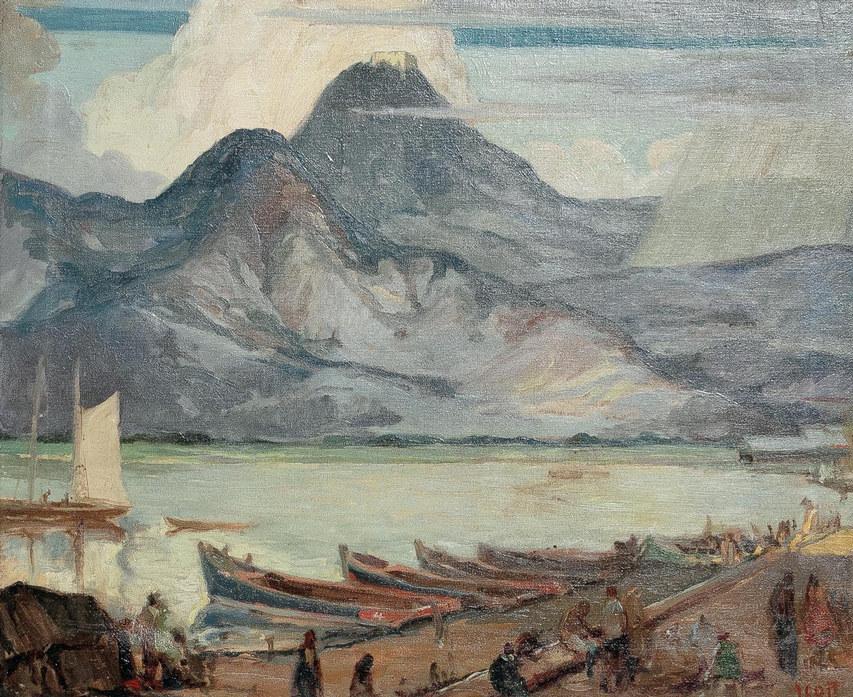

Portrait of Robert Sengstacke Abbott, c. 1920s
9-1/2 x 6-1/2 inches (image) full margins signed in the margin
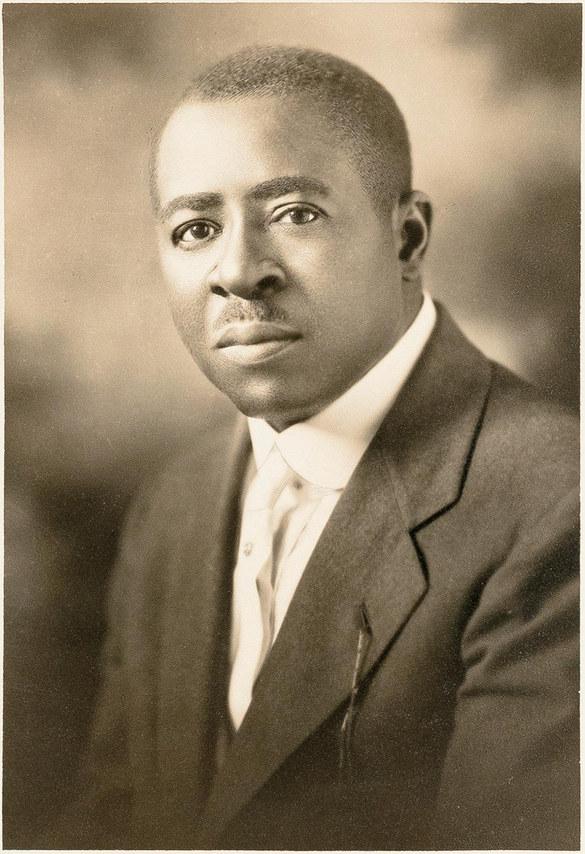
James Baldwin Speaks in Montgomery March, 1964 gelatin silver print 11 x 14 inches (sheet) signed and dated, stamped Amalgamated Publishers

A Screen Scene, 1964
gelatin silver print
14 x 11 inches (sheet)
signed and dated, stamped Amalgamated Publishers

19-1/2 x 13 inches (image) signed and dated
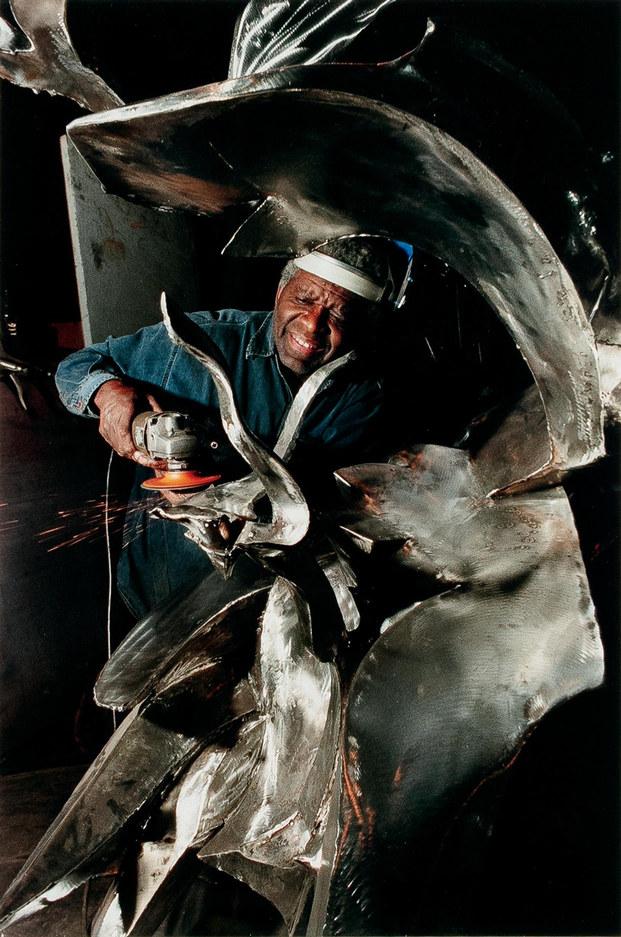
Yaxchilan, 1963
oil on canvas
67 x 72 inches signed artist label verso with title and address
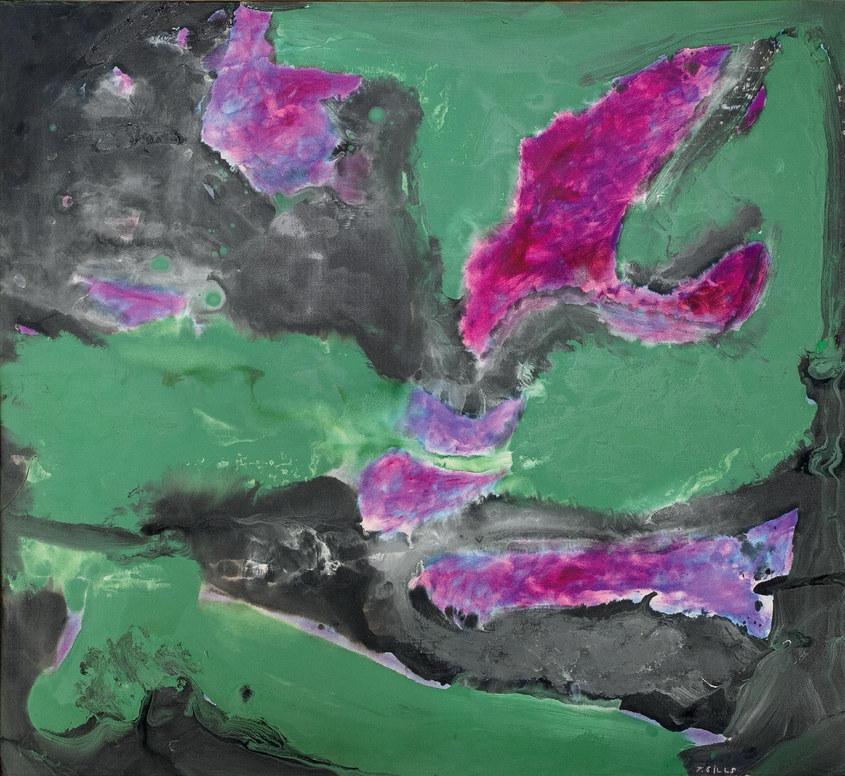
untitled, 1975 acrylic on shaped paper
32 x 24-1/2 inches signed and dated; dedicated: To Jim Parker, A Dear Friend
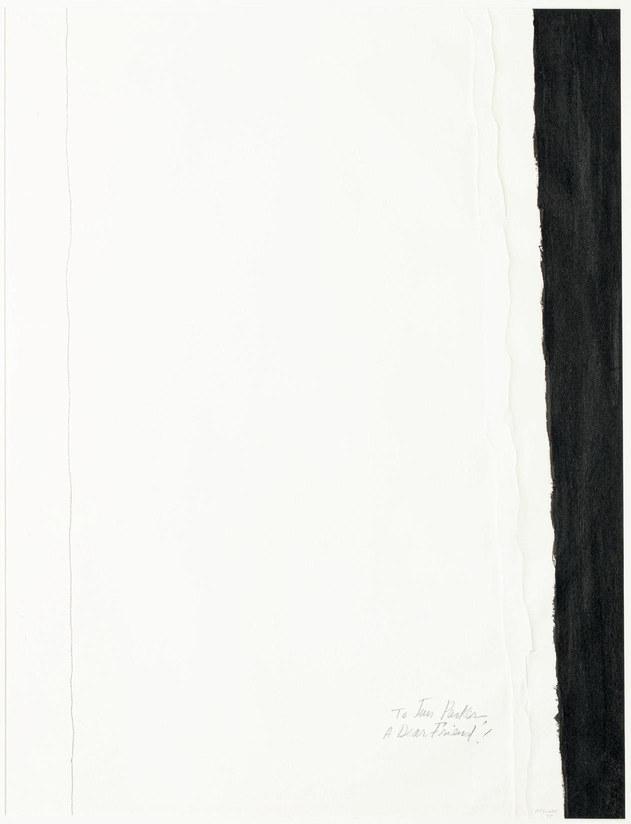
The Triumph of B.L.S, 1974 etching and aquatint
13-3/4 x 17-7/8 inches (image) 22-1/4 x 30 inches (sheet) signed, dated, titled and numbered 19/35 from the portfolio, Impressions: Our World, Volume I

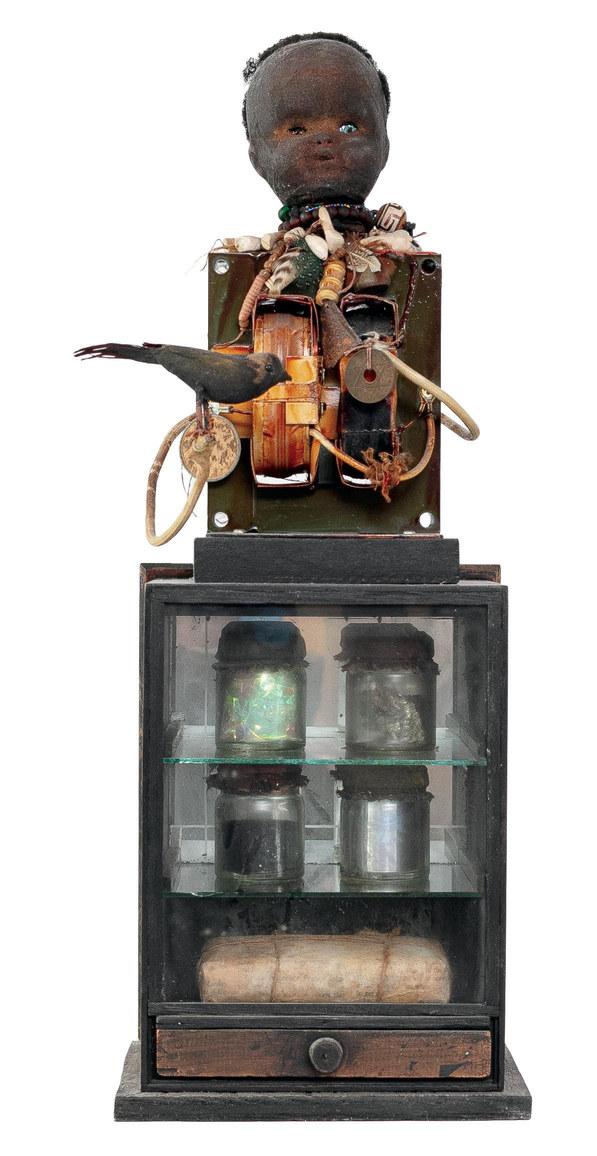
Power Object, Homage to Joseph Cornell, 1991 wood, metal, mixed media 20-1/2 x 8-1/2 x 10 inches artist labels verso
Gateway in Tangier 1905-1910 etching
9-1/2 x 7-1/8 inches estate stamp, Works of Art by Henry O. Tanner, authenticated by his son Jesse O. Tanner, Le Douhet, France signed by Jesse, and numbered 14/120 verso
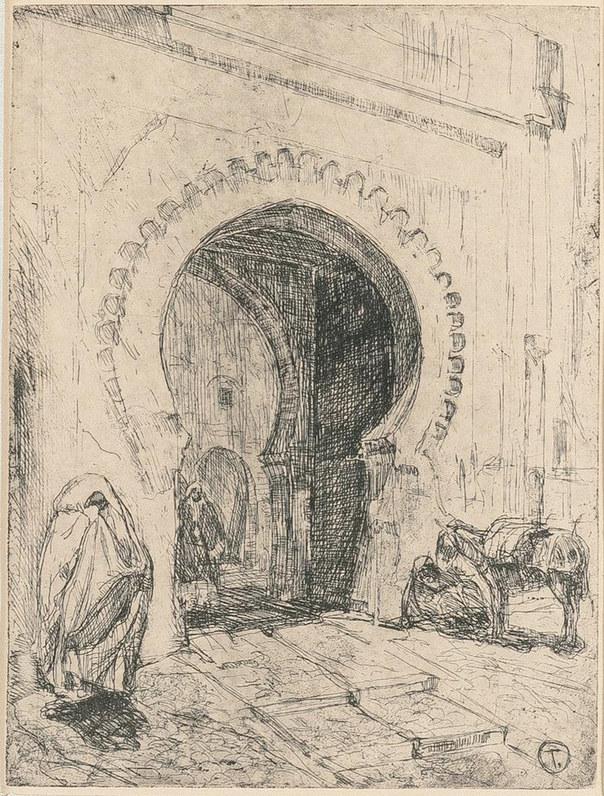
untitled, c. 1968
acrylic and pencil on Arches paper
22-1/8 x 30-1/2 inches initialed


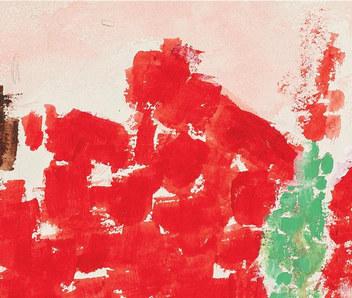
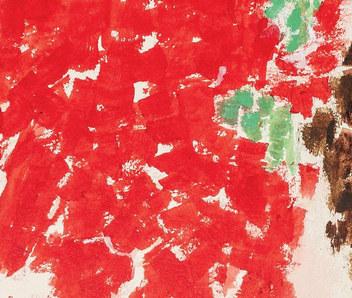
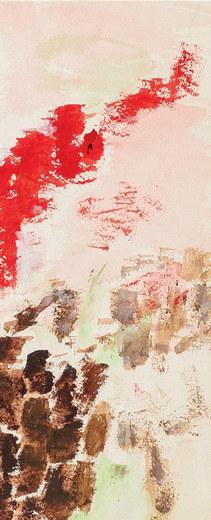
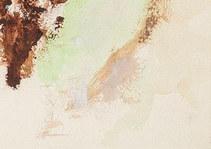
untitled, c. 1960
acrylic on paper
11-1/4 x 17-1/2 inches (image) initialed label verso
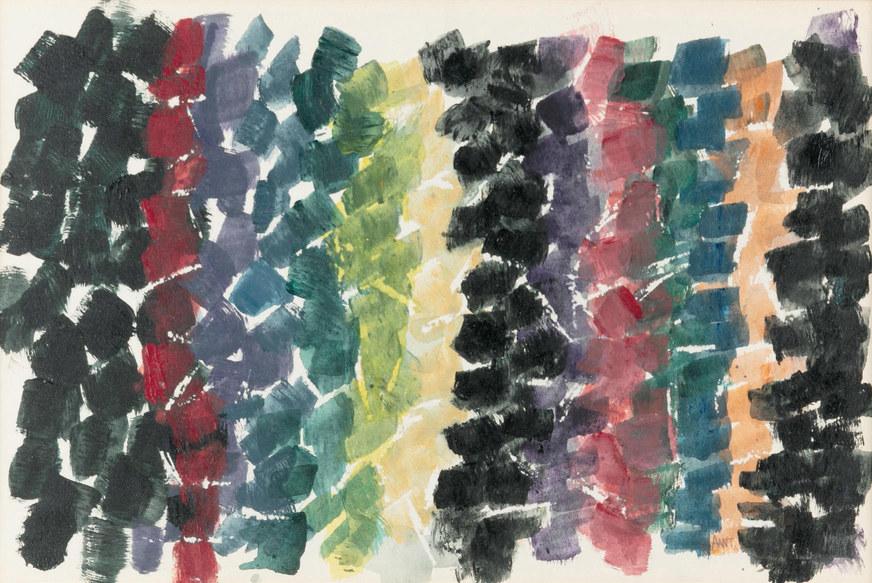
Carrot Cake Walk, 1976/1980 serigraph, 2 sheets each 22 x 30 inches 44 x 30 inches overall signed, titled, dated, and numbered 4/50

Old Barns, 1937-1938 etching and aquatint 9 x 12 inches (image) image full margins signed and titled in pencil
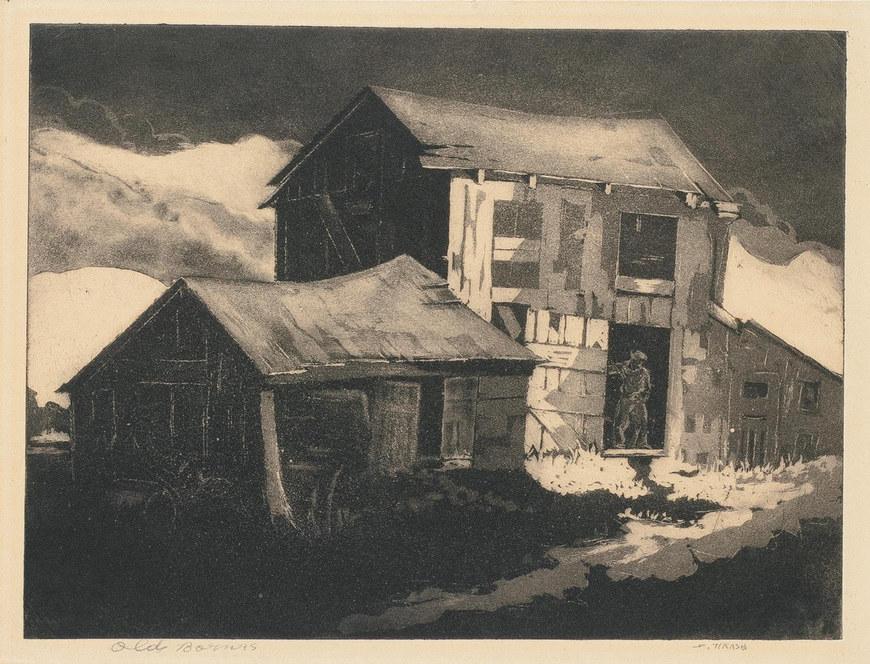
Portrait, 1930-1935 graphite and brown pencil on paper 6-7/8 x 5-3/8 inches unsigned
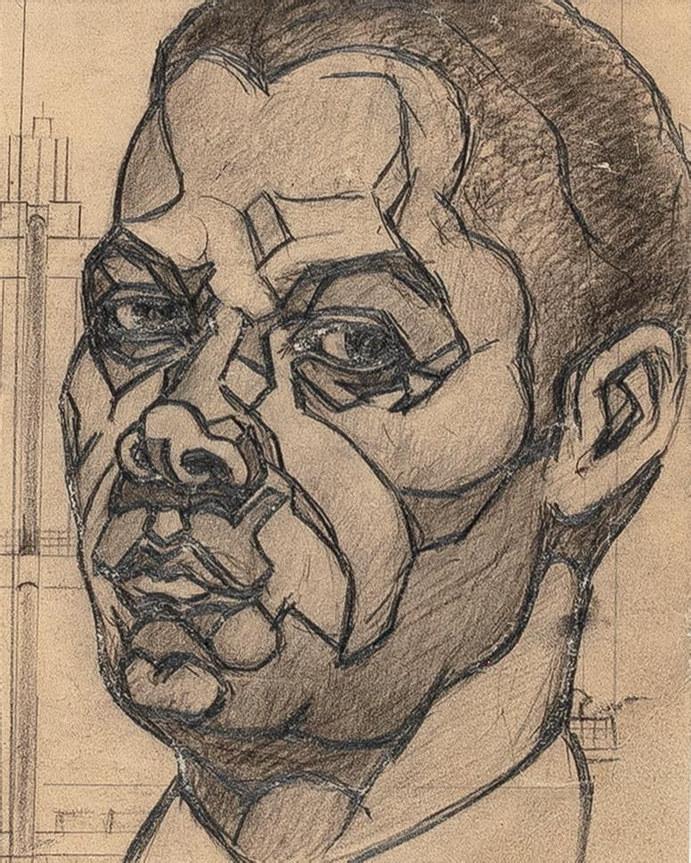
untitled, 1924 photogravure
12 x 8 Inches (image), full margins signed and dated in plate only

Almost, 1970 linoleum cut print with added crayon 10 x 8 inches, full margins signed, dated, titled, and numbered 2/3

untitled, 1976 marker on tan paper 24 x 17 inches signed and dated

Tuesday Dinners, c. 2015
acrylic and oil on canvas
8 x 24 inches signed and titled verso

Prophet II, 1975
color lithograph
25 x 35-1/2 inches (sheet)
signed, titled, dated with trial proof from an edition of 17
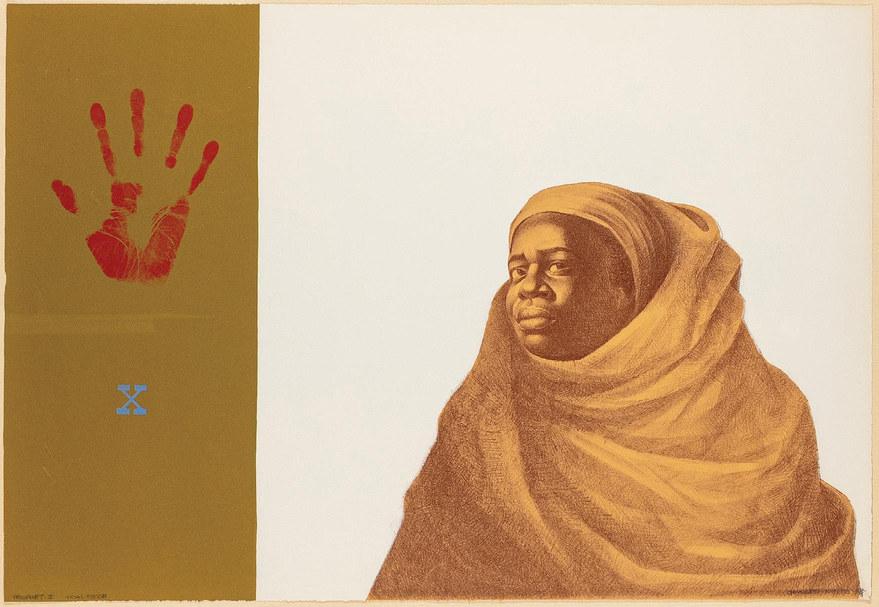
Gideon, 1956 lithograph 20 x 15 inches signed, titled, dated, and dedicated: To Janet and Clifford with My Warmest Wishes edition of 50
Printed by the Robert Blackburn Printmaking Workshop, NY
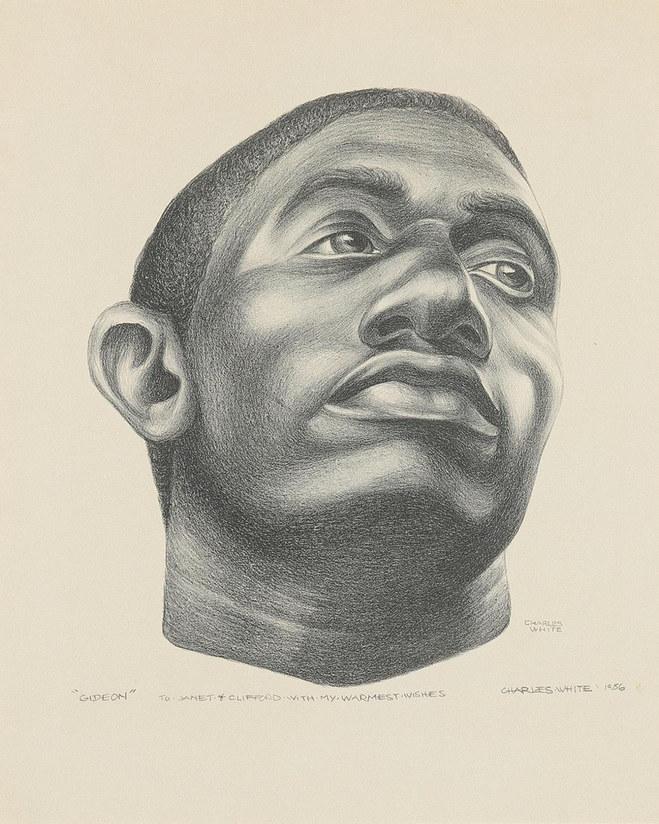
Wanted Poster Series #14, 1970 lithograph 21-15/16 x 29-15/16 inches (sheet)
signed and dated with Presentation Proof annotated “for Betty ” in pencil
Published by the Tamarind Institute, Harry Westlund, printer

Juba, 1965 lithograph on cream Arches paper 16-5/8 x 24-3/4 inches (full margins) signed, dated, and numbered 25/ E.D. Artist Proof printed by Joe Funk, Los Angeles, with the blind stamp

Sound of Silence, 1978 lithograph on cream paper 25 x 34-1/2 inches signed, titled, with T/P 71 E.D.
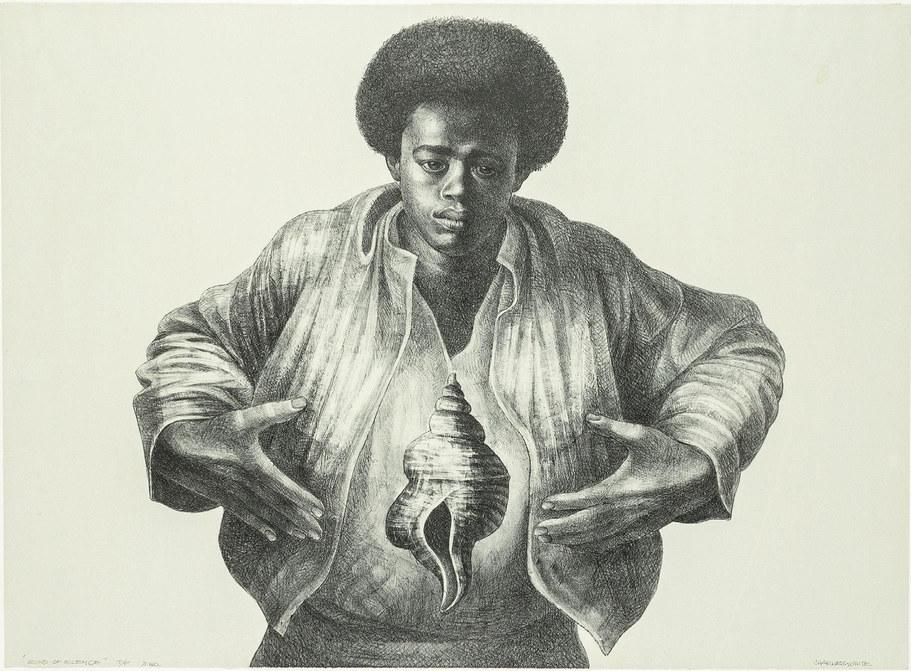
Alexander the Great (Study), 2005 ink, gouache and pencil on tan paper 24 x 18 inches signed and dated
gallery labels verso: Deitch Projects, New York, NY and Rhona Hoffman Gallery, Chicago, IL
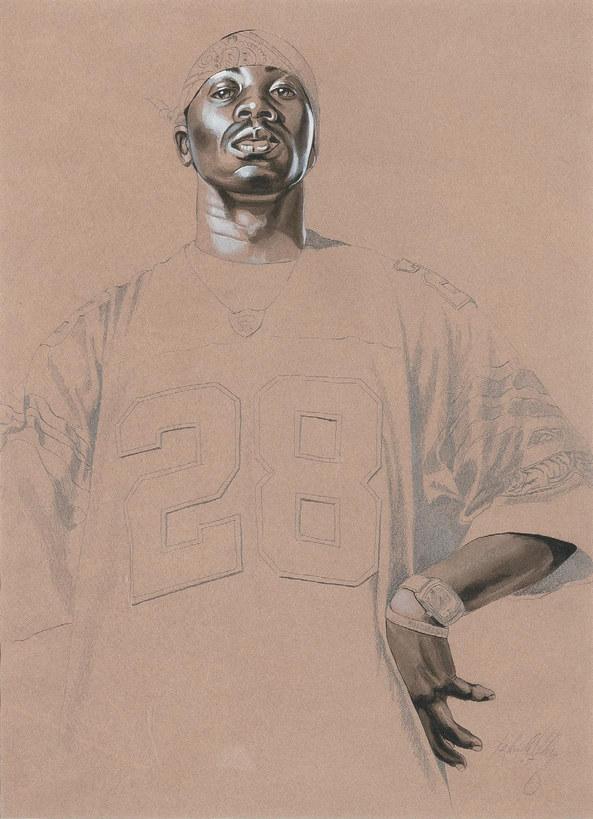
Carnaval of the Spirits, 1984 monotype on paper 22-1/4 x 34-3/4 signed, titled, and dated annotated, monotype in pencil

Girl with Butterflies, 1962 color woodblock print 23-1/2 x 30 inches (image) full margins signed, titled, dated, and numbered, 10/20

Butterflies, 1979 color woodblock print
20 x 24-3/4 inches (image) full margins signed, titled, dated, and numbered, A.P. 1/14
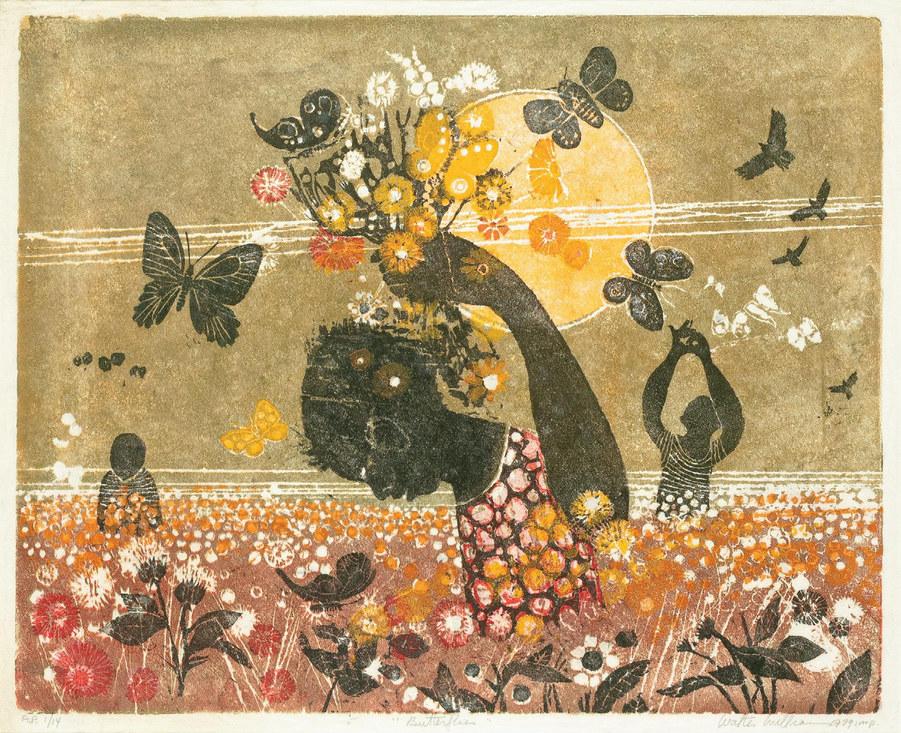
untitled, c. 1971
acrylic and graphite on paper
43-1/2 x 33 inches signed

untitled, 1983 lithograph
19-1/4 x 13-1/4 inches (image) full margins signed, dated, and numbered 7/8

Dialogue, 1973 etching and aquatint on cream wove paper
13-3/4 x 17-3/4 inches (image) full margins
16-5/8 x 20-5/8 inches (sheet) signed, titled, dated, and numbered 19/35

untitled (Standing Figure), c. 1960
charcoal drawing
21 x 12-1/2 inches (image) signed
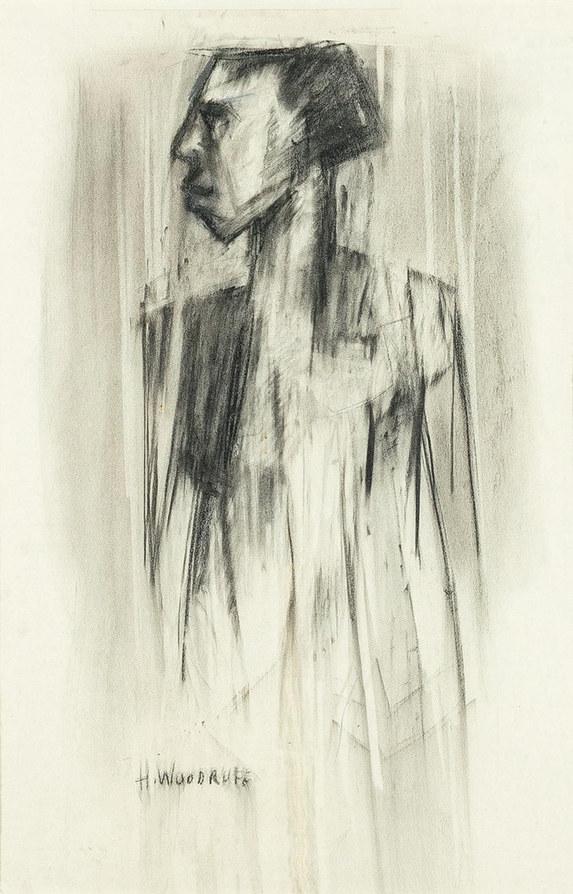
A Celestial Gate, 1977 color screenprint on Arches paper
18-3/4 x 21-1/2 inches (image) 21-3/4 x 26-1/4 inches (sheet) signed, titled, dated, and numbered 190/190
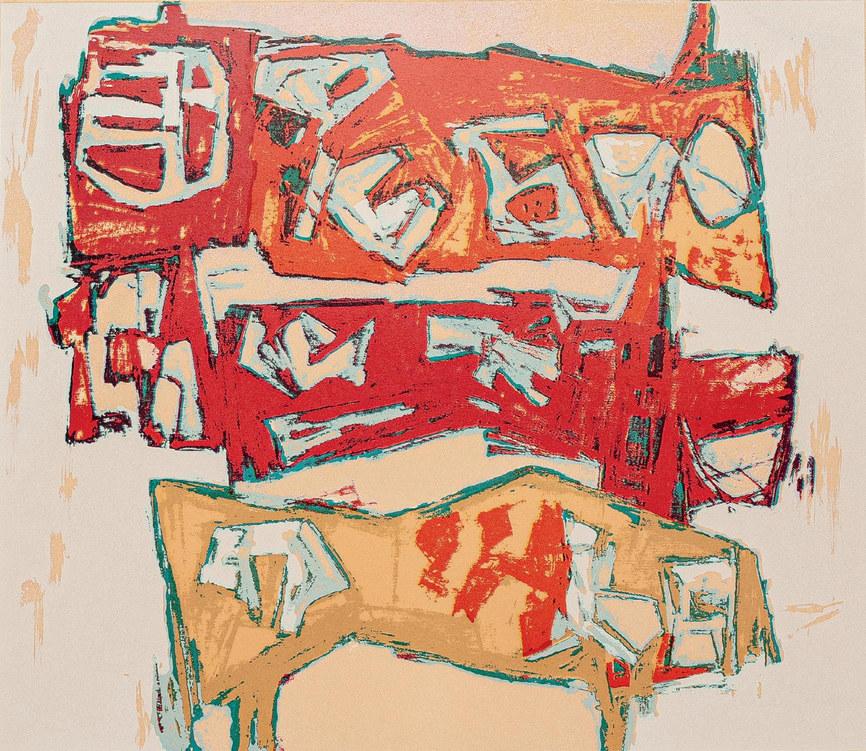
Terry Adkins (1953-2014)
Play Heavy, 1993
steel, hoses, rubber tires
29 x 24 x 22 inches
Exhibited: Recital, 2003, curated by Ian Berry, Dayton Director of the Frances Young Tang Teaching Museum and Art Gallery at Skidmore College, in collaboration with the artist.
Emma Amos (1937-2020)
American Girl, 1974 etching and aquatint
15-5/8 x 19-3/4 inches
signed, titled, dated, and numbered 19/35
Benny Andrews (1930-2006)
The Red Wrap, 1970 oil on board
12 x 9 inches
signed and dated; label verso from ACA Galleries, New York, NY
Ralph Moffat Arnold (1928-2006)
Mankato, 1968
acrylic on linen with collage element
24 x 24 inches
signed, titled, and dated verso
A Peace Piece, c. 1968-1970
mixed media collage on paper
18 x 24 inches
signed; titled verso
From the Windows, 1995 mixed media collage
10 x 12 inches
signed and dated
Romare Bearden (1911-1988)
Ritual Bayou (Byzantine Frieze), 1971 editioned collage (from an original set of 6) color photo-lithograph mounted on finished plywood, as issued
15-1/2 x 20 inches
signed and numbered 24/75
Published by Sherwood Publishers, NY
Ritual Bayou Series, Memories, 1971 editioned collage (from an original set of 6), color photo-lithograph mounted on finished plywood, as issued 15-1/2 x 20 inches
signed and numbered 24/75
Published by Sherwood Publishers, NY
Ritual Bayou (Carolina Interior), 1971 editioned collage (from an original set of 6) color photo-lithograph mounted on finished plywood, as issued 15-1/2 x 20 inches
signed and numbered 24/75
Published by Sherwood Publishers, NY
Jazz II Deluxe, 1980 color screenprint
26-3/4 x 37-1/2 inches (full margins) signed with A/P Gelburd/Rosenberg GG#100
The Family, 1975 color aquatint and photo engraving 19-1/2 x 25 inches (sheet) signed and numbered, 138/175
Printed by the Printmaking Workshop, NY and published by Transworld Art, NY with the blind stamp lower right From An American Portrait, 1776-1976 GG#55A
Sherman Beck (b. 1942)
untitled, 2004
acrylic on canvas
24 x 30 inches
signed and dated
Amir Bey (contemporary)
Awakening, 1974
carved and glazed stone
7-1/2 x 6-1/2 x 4 inches
signed, titled, and dated
Dawoud Bey (b. 1953)
Five Children, Syracuse, NY, 1996
gelatin silver print 11 x 14 inches
signed and dated
Robert “Bob” Blackburn (1920-2003)
Interior, 1958
color lithograph on cream wove paper
11-7/8 x 8-7/8 inches (full margins)
16 x 15 inches (sheet)
signed and titled aside from an edition of 12
Quiet Instrument, 1958
color lithograph on cream wove paper
11-3/4 x 8-3/4 inches (image)
22-1/4 x 15 inches (sheet)
signed and titled aside from an edition of 10
A similar example is in the collection of the Metropolitan Museum of Art.
Sylvester Britton (1926-2009)
untitled, 1971
mixed media collage
12 x 10 inches
signed and dated
James Brown (20th century)
untitled, c. 1980 watercolor and collage 30 x 22-1/2 inches unsigned
Vivian E. Browne (1929-1993)
Horseman, 1974 etching and aquatint on light cream wove paper
14 x 11-3/4 inches (full margins) signed, titled, dated, and numbered, 19/35
Beverly Buchanan (1940-2015)
untitled, 1986
found wood, foam core, acrylic 10-1/2 x 9 x 6 inches signed and dated
Margaret Burroughs (1917-2010)
Face of Africa, 1956 original linoleum cut print 12 x 10 inches signed, titled, and dated
David Butler (1898-1997)
untitled, c. 1980 sculpture/assemblage painted roofing tin and wood 9 x 13 inches (base is 4 in square) unsigned (typical)
William Sylvester Carter (1909-1996)
The Village, 1979 gouache on paper 14-1/2 x 19-1/2 inches signed and dated titled on label verso
untitled, 1979 ink on paper
13-1/2 x 10-1/2 inches
signed and dated
Elizabeth Catlett (1915-2012)
untitled (Confrontation), 1941 oil on canvas
15 x 18 inches signed and dated
Cabeza Contando, 1960 bronze on a wooden base
9-3/4 inches (h) initialed, E.C.
Cabeza Indigena, 1955 lithograph on wove paper
12-1/8 x 10-1/2 inches (image)
21-7/8 x 16-7/8 inches (sheet) signed and numbered 7/20 dedicated, To Hallie, with love
Barbara Chase-Riboud (b. 1939)
Akhmatova’s Monument, 1995 color offset lithograph
29-3/4 x 21-1/2 inches (sheet)
signed, titled, and dated, with Paris, September 1995, and numbered 70/163
Ed Clark (1926-2019)
untitled (NY Series), 2004
acrylic on canvas
40 x 49-1/2 inches
signed, titled, and dated verso label verso from Parish Gallery, Washington, DC
Yucatan Series, 1976-1977 color intaglio relief print on Arches paper
21-1/2 x 28 inches (full margins) edition of 12
Printed by Robert Blackburn’s Printmaking Workshop, NY
Yucatan Series, 1976 color intaglio relief print on Arches paper
22 x 27-1/4 inches signed, titled, and dated dedicated To Bob, with A/P
Irene V. Clark (1927-1980)
untitled, (Girl with Pear), c. 1950 oil on board
22 x 11 inches
signed
Willie Cole (b. 1955)
E21000-TM, 1991 photolithograph with metallic powder additions and collage
41 1/2 x 29 15/16 inches edition of 30 with 6 additional proofs; inscribed R.I.
Published by New Jersey State Council on the Arts, Rutgers Center for Innovative Printmaking, New Brunswick, New Jersey
Robert Colescott (1925-2009)
Paintings I Promised Never to Paint: Man
Crying, 1965
oil on canvas
12 x 14 inches
signed and dated label verso: G.R. N’Namdi
untitled, (Ladies in Waiting), 1986 charcoal drawing on paper
61 x 42 inches signed and dated
Dan Concholar (1939-2017)
Mask Series #9, 1977 pastel on paper
18 x 13-1/2 inches
signed, titled, and dated
Eldzier Cortor (1916-2015)
untitled, (Figure in Bedroom), c. 1945 brush, pen and ink on cream wove paper
11-1/2 x 8-1/2 inches signed
untitled, (Figure Composition), c. 1940 ink and watercolor on cream paper
22 x 15-1/2 inches signed
Ernest Crichlow (1914-2005)
Young Worker, 1974-1975
color etching and aquatint
23 7/8x17 3/4 inches (image), full margins unsigned aside from an edition of 20
Allan Rohan Crite (1910-2007)
The Presentation, c. 1970
offset lithograph
21-3/4 x 16-3/4 inches (image), full margins signed and numbered, 58/150
Emilio Cruz (1938-2004)
Dancers (Floating Figures), c. 1965-1970 oil on canvas
24 x 30 inches
Zabriskie Gallery, NY inventory number verso
untitled, 1980 pastel on peach colored paper
19-1/2 x 25 inches
signed and dated
Mary Reed Daniel (1946-2006) untitled, (Portrait of a Woman) c. 1980
monotype with watercolor on tan paper
14 x 16-1/2 inches signed
Joseph Delaney (1904-1991) untitled, (Still Life), c. 1940 oil on canvas board
28 x 20 inches (rounded corners) signed
Louis Delsarte (1944-2020)
Michelle Parkerson, c. 1990 watercolor, pastel and pencil on paper
34 x 27 inches signed
Thornton Dial (1928-2016) untitled, c. 1990 watercolor on paper
18 x 23-1/2 inches initialed
John E. Dowell (b. 1941)
Sassy, 1981 color lithograph on Arches paper
30 x 22
signed, titled, and dated with AP
Doucement, 1980
lithograph
23-3/4 x 17-3/4 inches (image), full margins signed, titled, and dated, with AP Spring Quartet III, 1975 watercolor on Arches paper
30 x 22 inches signed, titled, and dated label verso from Dart Gallery, Chicago
Melvin Edwards (b. 1937) untitled, c. 1970s etching and aquatint
19-1/2 x 23-1/2 inches signed, with Working Proof written in pencil
Amos Ferguson (1920-2009)
untitled, 1994 enamel on cardboard
14 inches diameter signed and dated
untitled, 1994 enamel on Cornflakes box piece 12 x 8 inches signed and dated
Lawrence Finney (b. 1939) untitled, 2010 oil on canvas
12 x 16 inches signed signed and dated verso
Reginald Gammon (1921-2005) Shame, 1948
lithograph on Strathmore paper
10-1/2 x 8 inches (image) (full margins) signed, titled, dated, and numbered A/P, 2/2
Lamerol Gatewood (b. 1954) untitled, 1982 pastel on paper
16-1/2 x 24 inches signed and dated
Sam Gilliam (1933-2022) Hanover, 1975
acrylic with overlapping canvas on beveled stretcher
48 x 54 inches signed, titled, and dated verso
Bernard Goss (1913-1996) untitled, (Mob Law), c. 1960 pencil drawing on paper
15 x 10-3/4 inches signed inscription by Margaret Burroughs under signature: 8/19/82, circa 1960, and initials
John Wesley Hardrick (1891-1968) untitled, (Autumn Landscape), c. 1935 oil on board
8 x 10 inches signed
Maren Hassinger (b. 1947) Floating, 1944 offset lithograph
21-1/2 x 30 inches signed, dated (7-1-94), titled and numbered 12/100 label verso from Rabbet Galleries, NJ
Leon Hicks (b.1933)
Black Boy, 1961 etching
18 x 10 inches signed, titled, and dated with artist proof
Earl J. Hooks, Sr. (1927-2005)
untitled, c. 1960
glazed ceramic sculpture
31 inches (h)
signed
Hyde Park Alley, 1981
gelatin print
10 x 6-1/2 inches (image)
signed and dated in pencil on mat and stamped verso
Exhibited: Alabama Art League, 52nd
Annual Exhibition
bowl, c.1960
glazed ceramic vessel
6 inches high, 8 inches diameter signed underneath
multi-pod vessel, c. 1960
glazed ceramic sculpture
9 x 13 x 10 inches signed underneath
untitled, c. 1960
glazed terra cotta vessel
8-1/2 (h) x 8 inches (diameter)
Herbert House (20th century)
untitled, 1977
welded steel sculpture
(repurposed car bumpers)
93 x 27 x 26 inches
signed and dated
untitled, c. 1970
welded and painted
steel sculpture
58 x 30 x 23 inches
unsigned
Manuel Hughes (b. 1938)
untitled, (Ribbons), c. 1980s colored pencil and pastel on gray paper
19 x 23-1/2 inches (image) signed faintly in pencil lower left
Margo Humphrey (b. 1942)
The History of Her Life
Written across Her Face, 1991 color lithograph with collage element and various gold leafs
30 x 30 inches, full margins signed, titled, dated, and numbered 17/30
Richard Hunt (1935-2023)
Natural Form No. 2, 1966
welded chromed steel
14 x 23 x 8 inches
signed and dated
Exhibited: Somewhere There’s Music, An Exhibition Honoring Richard Howard Hunt; Visual Arts Gallery at Governors State University, August 24th-September 26th, 2015. University Park, IL.
untitled (Wall Piece), 1961
welded chromed steel
46 x 16 x 10 inches
signed and dated on interior; conjoined initials on exterior
Exhibited: Somewhere There’s Music, An Exhibition Honoring Richard Howard Hunt; Visual Arts Gallery at Governors State University, August 24th-September 26th, 2015. University Park, IL.
untitled, Hybrid Form, 1974 cast bronze
65 x 24 x 18 inches
signed and dated with AP
Exhibited: Somewhere There’s Music, An Exhibition Honoring Richard Howard Hunt; Visual Arts Gallery at Governors State University, August 24th-September 26th, 2015, University Park, IL.
Monument No. 2, 1964 welded and chromed steel
45 x 10 x 7 inches signed and dated
Exhibited: Somewhere There’s Music, An Exhibition Honoring Richard Howard Hunt; Visual Arts Gallery at Governors State University, August 24th-September 26th, 2015, University Park, IL.
Sky Form, 1958 welded steel
31 x 32 x 12 inches
signed and dated
Exhibited: Somewhere There’s Music, An Exhibition Honoring Richard Howard Hunt; Visual Arts Gallery at Governors State University, August 24th-September 26th, 2015, University Park, IL.
untitled, 1965 lithograph
30-1/4 x 22-1/2 inches
signed and numbered 5/20
Illustrated: Richard Hunt, 2022; Gregory R. Miller & Co., p.190.
untitled, c. 1965 color lithograph 15 x 15 inches
signed, with artist’s proof
untitled, 1965 color lithograph
15 x 15-1/8 inches (sheet) signed, with artist proof
untitled, 1990 oil stick on cream paper
29 x 39 inches (image) signed and dated
untitled, c. 1975 color lithograph 22 x 29-1/2 inches (image) full margins signed, with A/P
Bill Hutson (b. 1936)
Welkin Series #10, 1977 acrylic on paper
22-1/2 x 29-1/2 inches signed; signed, titled, and dated verso, New York, 1977
Suzanne Jackson (b. 1944)
Eating-New York, 1977 watercolor on illustration board 20 x 15 inches signed; signed, titled, and dated on verso in pencil
Fred D. Jones, Jr. (1914-2004)
untitled, c. 1960 oil on canvas
26 x 18 inches signed
untitled, (The Unicorn), c. 1955 oil on canvas
8 x 10 inches signed
Seydou Keita (1921-2001)
The Girls from Mali, 2001 gelatin silver print
18-7/8 x 13-3/8 inches
signed, dated in the margin; numbered verso 5/100
Jacob Lawrence (1917-2000)
Confrontation at the Bridge,1975 color silkscreen on Strathmore paper
19-1/2 x 25-3/4 inches signed, titled, dated and numbered 34/125
Legend of John Brown # 20, John Brown held Harper’s Ferry for 12 hours. His defeat was a few hours off, 1977 silkscreen print on Domestic Etching Paper through hand-cut stencils
14 x 20 inches (image)
20 x 25 7/8 inches (sheet)
signed, dated, and numbered 31/60, inscribed no. 20
Clifford Lee (1926-1985)
untitled, c. 1975
acrylic on canvas
34 x 18 inches
signed
Norman Lewis (1909-1979) Carnaval, 1974 etching and aquatint with embossing
19-13/16 x 12-3/16 inches (plate)
30-1/16 x 22-1/4 inches (sheet) signed, titled, dated , and numbered, 25/35
From a portfolio of seven etchings by various artists
Printed and published by Printmaking Workshop, NY
Seascape, 1952 oil on canvas
12 x 26 inches
signed and dated Willard Gallery label verso with title
Counter Intervention, 1954 oil on paper
19 x 24 inches (sheet) signed and dated
Kerry James Marshall (b. 1955)
Compositional Study for SOB, SOB, 2002
graphite and charcoal on paper
24 x 19 inches (sheet) signed and dated
Everything Will Be Alright..., 2004 woodcut and screen print on grey BFK Rives paper
27 x 41-1/2 inches (image)
30 x 44 inches (sheet) signed, titled, dated, and numbered, 2/25
Keeping the Culture, 2011 color linoleum cut and screenprint on Arches paper
17-1/2 x 28 inches signed, titled, dated and numbered 18/100
Richard Mayhew (1924-2024) untitled, c. 1990 pencil drawing on paper 14 x 20 inches
signed
William McBride (1912-2000) untitled, c. 1975
acrylic on canvas 12 x 9 inches
signed
Beverly McIver (b. 1962)
Apples With Cup, 1999 oil on paper
16 x 20 inches
signed and dated label verso with title
Sam Middleton (1927-2015)
untitled, 1964
color lithograph
16 x 10-1/4 inches (image) full margins signed, dated, and numbered 10/15
Clarence Morgan (b. 1950)
Organized Opposition, Strange Amalgamation, Complete Isolation, 2005
suite of three works etching, aquatint and mixed media works
10 x 10 inches (each) each signed, titled, dated, and numbered 5/20
Gordon Parks (1912-2006)
American Gothic, Washington, D.C., 1942 (later imp.)
silver print
9-1/3 x 6-3/4 inches
signed
Marion Perkins (1908-1961)
untitled, (Head), c. 1950
carved marble
10-1/2 x 5 x 5 inches
untitled, The Artist’s Wife (Eva Gillion), c. 1950
carved stone
8 x 6-1/2 x 7 inches
Bertrand D. Phillips (b. 1938)
Canine Onslaught, c. 1970 oil on canvas
41 x 51 inches
signed
Harold K. Pierce (b. 1914) untitled (Standing Nude), c. 1940 brush ink on brown paper
12 x 9 inches
signed
Howardena Pindell (b. 1943)
Untitled 50, 1974 pen and ink, tracing pape, and powder on illustration board with supporting structure verso housed in its original plexiglass shadow box
9 x 14 inches (image) 16 x 20 inches (board) artist and gallery labels verso stamped, Howardena Pindell (with address)
Robert Pious (1908-1983)
American Negro Exposition Poster, 1940 serigraph on poster board 21-1/2 x 13-3/4 inches signed in the plate
Richard J. Powell (b. 1953)
Richard Wright Series #1: Good Boys Do Not Cry for Love, 1976 etching and aquatint
17-1/2 x 17-1/2 inches (full margins) signed, titled, and dated annotated with Working Proof
Steppin in Tall Cotton, 1980 etching and aquatint
24 x 17-1/2 inches (image) (full margins) signed, titled, dated, and numbered 3/15
Narrations: Tableau Vivant, 1978 etching and aquatint on cream wove paper
17 x 23-3/4 inches (image) full margins signed, titled, dated with A/P
Martin Puryear (b. 1941)
untitled, 1987 coated bronze
18 x 14 x 10 inches edition of 5
Becky (from Cane), 2000 woodblock print on cream Japanese handmade paper (katakana)
10 3/8 x 12 3/4 inches (image)
16-3/4 x 20-1/2 inches (sheet) signed, titled and numbered 13/50 Donald Young Gallery label verso
Mavis Pusey (1928-2019)
untitled (New Year), 1975-1976 lithograph
5-1/2 x 11 inches (image) full margins signed, numbered 16/35, and inscribed in pencil verso: I wish that 1976 will be one of your very best years, Mavis.
Robert Reid (1924-2002)
Landscape Near St. Ferme, 1991 watercolor and pencil on Arches paper
30 x 22-1/4 inches signed, titled, and dated
Alison Saar (b. 1956)
Black Snake Blues, 1994 offset color lithograph on wove paper
21-3/4 x 29-3/4 inches (sheet) signed, titled, dated and numbered 26/70 Printed and published by the Brandywine Workshop, Philadelphia, with the blind stamp lower left.
Betye Saar (b. 1926)
L.A. Energy (Mural Site: 5th Street between Flower and Grand), 1983 color lithograph
23-3/8 x 17-1/4 inches (image) 28-1/2 x 22-1/4 inches (sheet) signed, titled, dated, and numbered 16/20
Walter Sanford (1912-1987)
Beach Hat, c. 1960 pastel on paper
13-1/4 x 17 inches signed and titled
Raymond Saunders (b. 1934)
untitled, 1965-1975 color lithograph and offset lithograph with collage
29 x 23-1/2 inches artist’s ink stamp signature inscribed in pencil in left and right corners of paper: 38-75 (edition)
Augusta Savage (1892-1962)
Gamin, 1929 plaster with bronze painted patina 9 inches (h) signed and titled
John T. Scott (1940-2011)
Requiem for Steve Biko, c. 1990 mixed media collage in tondo (paint, stamp, plaster cast) on thick paper
9-1/4 inches diameter signed and titled
William Edouard Scott (1884-1964)
The Citadel, Haiti, c. 1930 oil on canvas
18-1/2 x 22 inches signed
untitled, (Swans), c. 1940 oil on canvas
30 x 22 inches signed
Addison N. Scurlock (1883-1964)
Portrait of Robert Sengstacke Abbott, c. 1920s
9-1/2 x 6-1/2 inches (image) (full margins) signed in the margin
Robert Sengstacke (1943-2017)
James Baldwin Speaks in Montgomery March, 1964
gelatin silver print 11 x 14 inches (sheet) signed and dated, stamped Amalgamated Publishers
A Screen Scene, 1964
gelatin silver print 14 x 11 inches (sheet) signed and dated, stamped Amalgamated Publishers
untitled, Portrait of Richard Hunt, 2000 c-print
19-1/2 x 13 inches (image) signed and dated
Thomas Sills (1914-2000)
Yaxchilan, 1963 oil on canvas
67 x 72 inches signed artist label verso with title and address
Al Smith (20th century) untitled, 1975
acrylic on shaped paper
32 x 24-1/2 inches signed and dated; dedicated: To Jim Parker, A Dear Friend
Vincent Smith (1929-2003)
The Triumph of B.L.S, 1974 etching and aquatint
13-3/4 x 17-7/8 inches (image)
22-1/4 x 30 inches (sheet) signed, dated, titled, and numbered 19/35 from the portfolio, Impressions: Our World, Volume I
Renee Stout (b. 1958)
Power Object, Homage to Joseph Cornell, 1991
wood, metal, mixed media
20-1/2 x 8-1/2 x 10 inches artist labels verso
Henry Ossawa Tanner (1859-1937)
Gateway in Tangier, 1905-1910 etching
9-1/2 x 7-1/8 inches
estate stamp, Works of Art by Henry O. Tanner, authenticated by his son Jesse O. Tanner, Le Douhet, France signed by Jesse, and numbered 14/120 verso
Alma Thomas (1891-1978)
untitled, c. 1968
acrylic and pencil on Arches paper
22-1/8 x 30-1/2 inches initialed
untitled, c. 1960
acrylic on paper
11-1/4 x 17-1/2 inches (image) initialed label verso
Phyliss Thompson (b. 1946)
Carrot Cake Walk, 1976/1980 serigraph
2 sheets, each 22 x 30 inches
44 x 30 inches overall
signed, titled, dated, and numbered 4/50
Dox Thrash (1893-1965)
Old Barns, 1937-1938 etching and aquatint
9 x 12 inches (image) image full margins signed and titled in pencil
Self Portrait, 1930-1935 graphite and brown pencil on paper
6-7/8 x 5-3/8 inches unsigned
James VanDerZee (1886-1983)
untitled, 1924 photogravure
12 x 8 Inches (image) (full margins) signed and dated in plate only
Ruth G. Waddy (1909-2003)
Almost, 1970 linoleum cut print with added crayon
10 x 8 inches (full margins) signed, dated, titled, and numbered 2/3
William “Bill” Walker (1927-2011) untitled, 1976 marker on tan paper 24 x 17 inches signed and dated
Dale Washington (1962-2020)
Tuesday Dinners, c. 2015 acrylic and oil on canvas
8 x 24 inches
signed and titled verso
Charles White (1918-1979)
Prophet II, 1975 color lithograph
25 x 35-1/2 inches (sheet) signed, titled, dated with trial proof from an edition of 17
Gideon, 1956 lithograph
20 x 15 inches
signed, titled, dated, and dedicated: To Janet and Clifford with My Warmest Wishes edition of 50
Printed by the Robert Blackburn Printmaking Workshop, NY
Wanted Poster Series #14, 1970 lithograph
21-15/16 x 29-15/16 inches (sheet) signed and dated with Presentation Proof annotated “for Betty” in pencil
Published by the Tamarind Institute, Harry Westlund, printer
Juba, 1965
lithograph on cream Arches paper
16-5/8 x 24-3/4 inches (full margins) signed, dated, and numbered 25/ E.D. Artist Proof printed by Joe Funk, Los Angeles, with the blind stamp
Sound of Silence, 1978 lithograph on cream paper
25 x 34-1/2 inches signed, titled, with T/P 71 E.D.
Kehinde Wiley (b. 1977)
Alexander the Great (Study), 2005 ink, gouache and pencil on tan paper
24 x 18 inches signed and dated Gallery labels verso: Deitch Projects, New York, NY and Rhona Hoffman Gallery, Chicago, IL
Michael Kelly Williams (b. 1950)
Carnaval of the Spirits, 1984 monotype on paper
22-1/4 x 34-3/4 signed, titled, and dated annotated, monotype in pencil
Walter H. Williams (1920-1988)
Girl with Butterflies, 1962 color woodblock print
23-1/2 x 30 inches (image) (full margins) signed, titled, dated, and numbered, 10/20 Butterflies, 1979 color woodblock print
20 x 24-3/4 inches (image) (full margins) signed, titled, dated, and numbered, A.P. 1/14
William T. Williams (b. 1942) untitled, c. 1971 acrylic and graphite on paper 43-1/2 x 33 inches signed
Maurice Wilson (b. 1954) untitled, 1983
lithograph
19-1/4 x 13-1/4 inches (image) (full margins) signed, dated, and numbered 7/8
John W. Wilson (1922-2015) Dialogue, 1973 etching and aquatint on cream wove paper 13-3/4 x 17-3/4 inches (image) (full margins)
16-5/8 x 20-5/8 inches (sheet) signed, titled, dated, and numbered 19/35
Hale Woodruff (1900-1980) untitled (Standing Figure), c. 1960 charcoal drawing 21 x 12-1/2 inches (image) signed
A Celestial Gate, 1977 color screenprint on Arches paper
18-3/4 x 21-1/2 inches (image) 21-3/4 x 26-1/4 inches (sheet) signed, titled, dated, and numbered 190/190
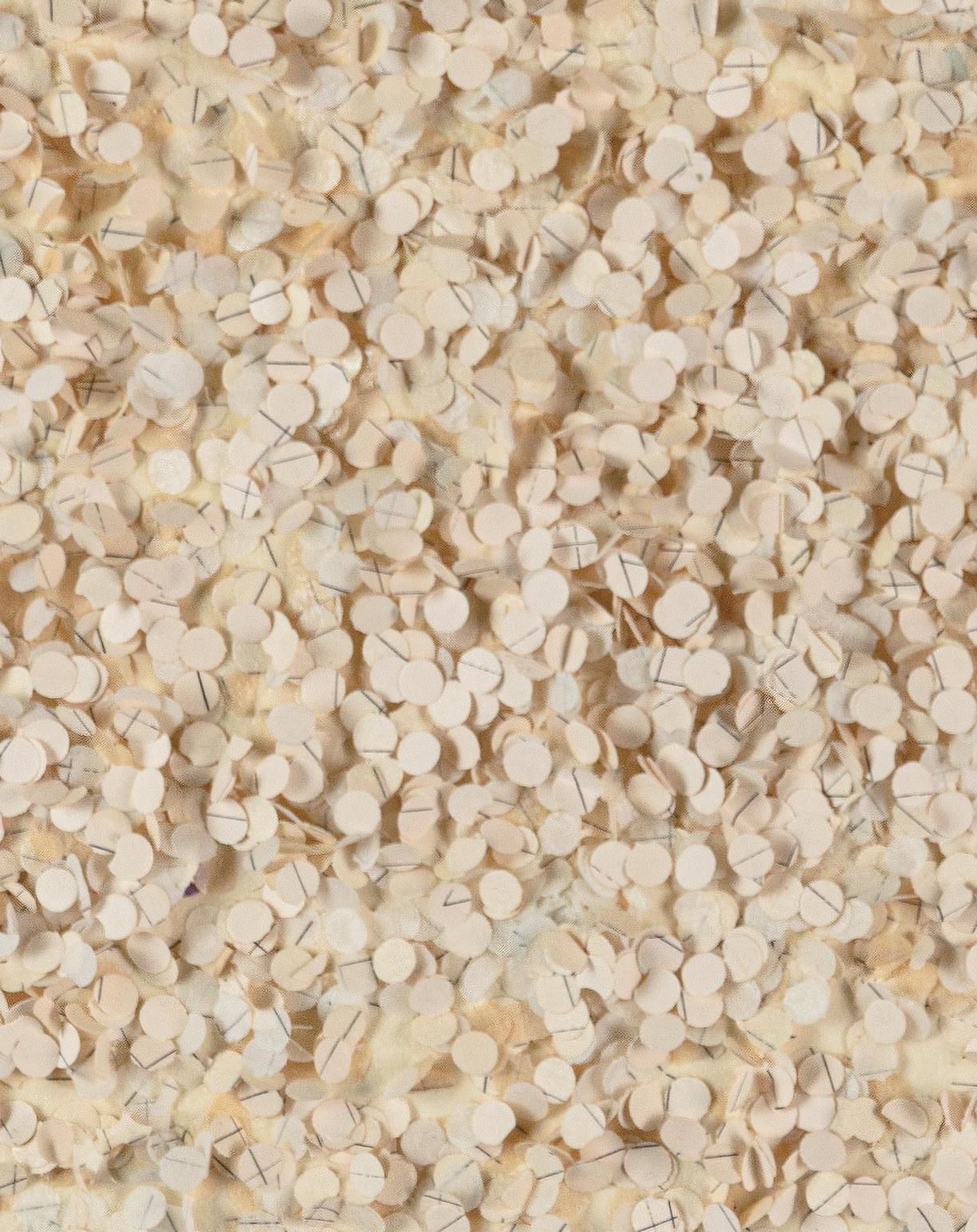
On October 18, 2025, Black Art Auction will present an historic auction of the Collection of the James T. Parker Art Trust. This auction will begin at 11AM CST.
For more information on these works, please email us at info@blackartauction.com or call us at 314-727-6249.
For a look at the entire collection and more information on the artists visit the website by using the QR code below.

